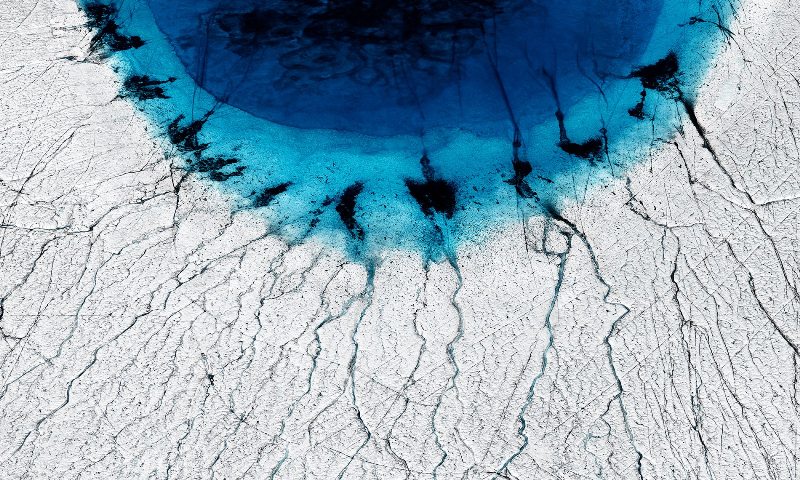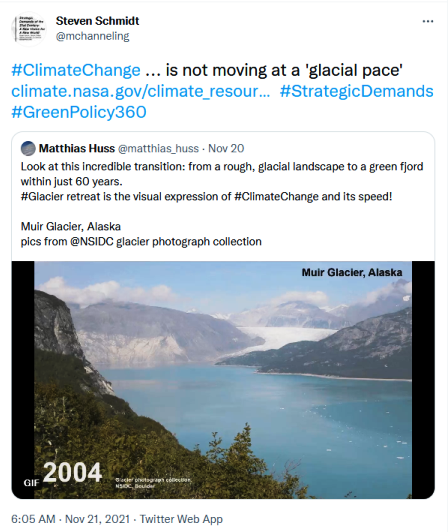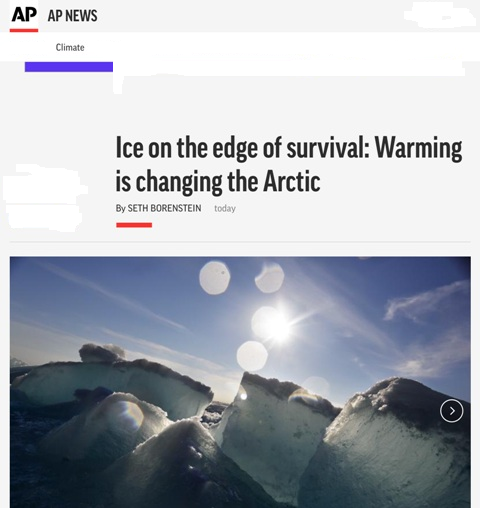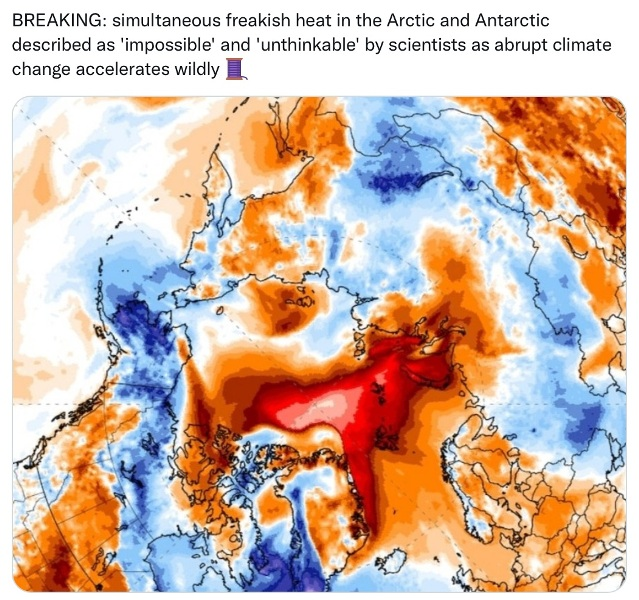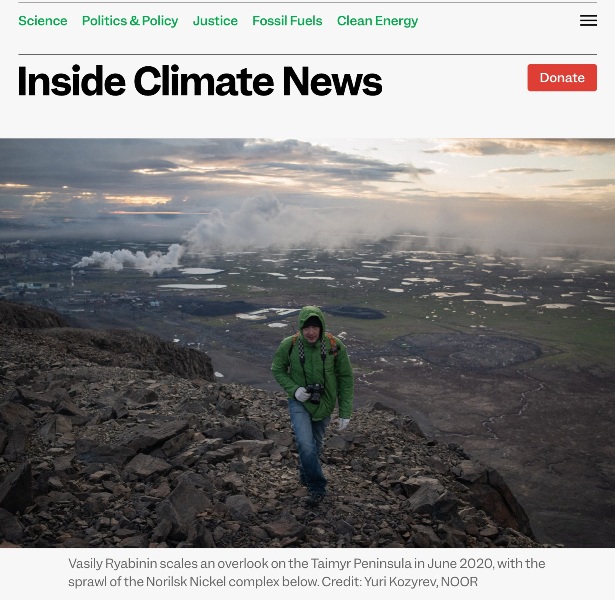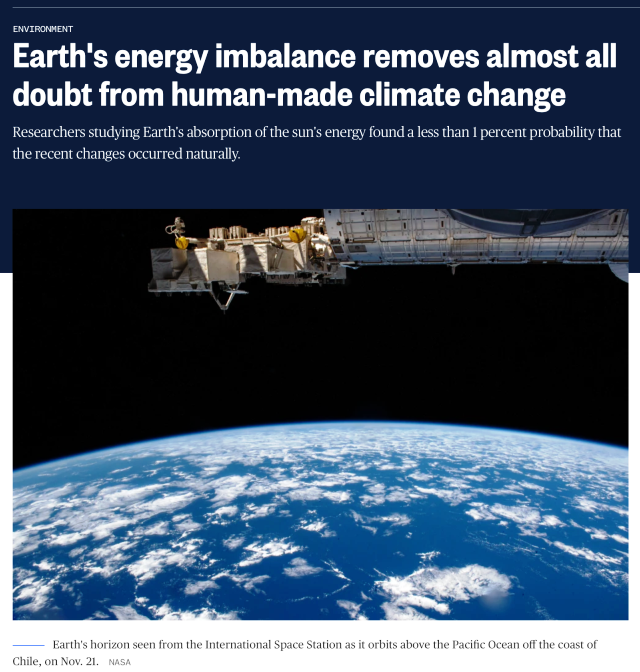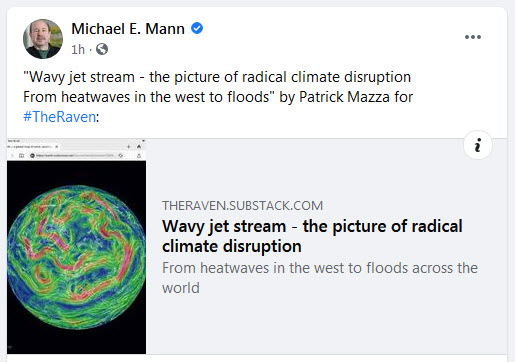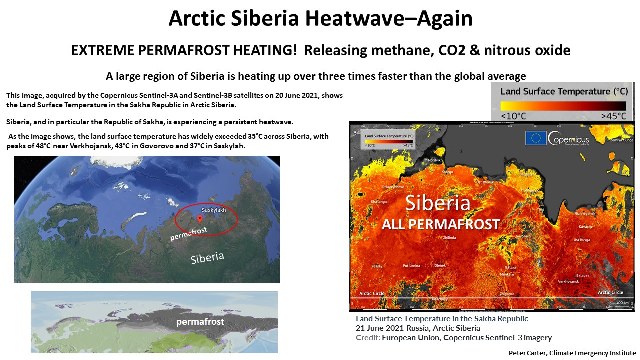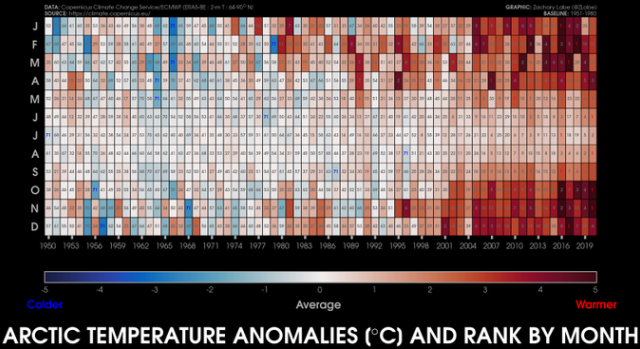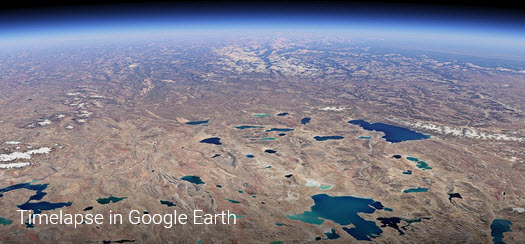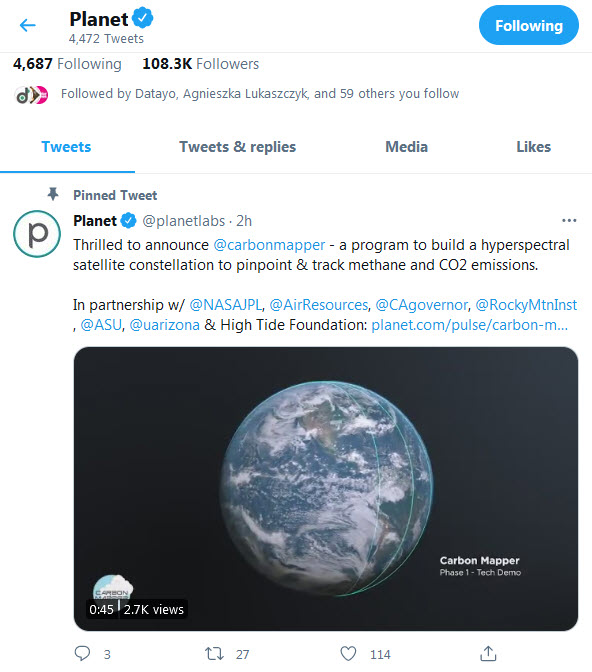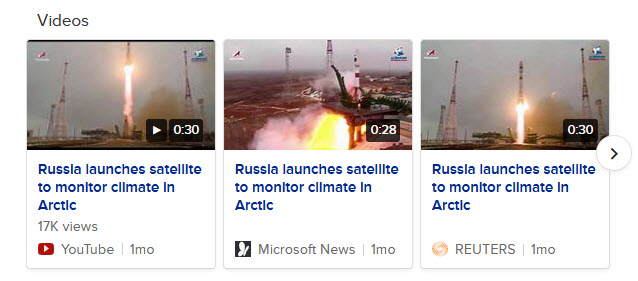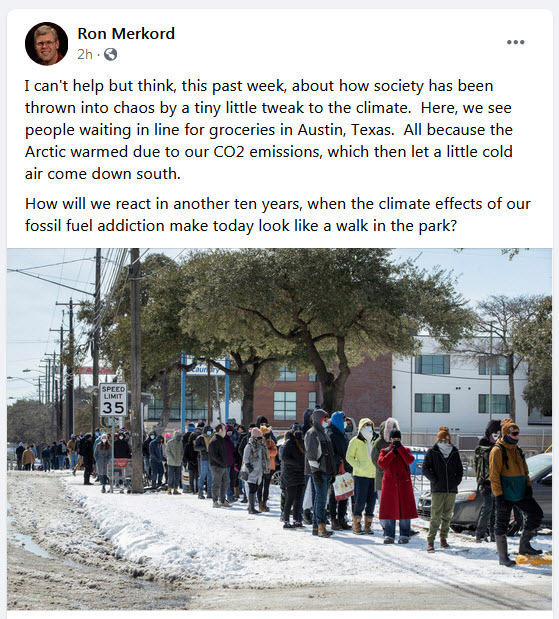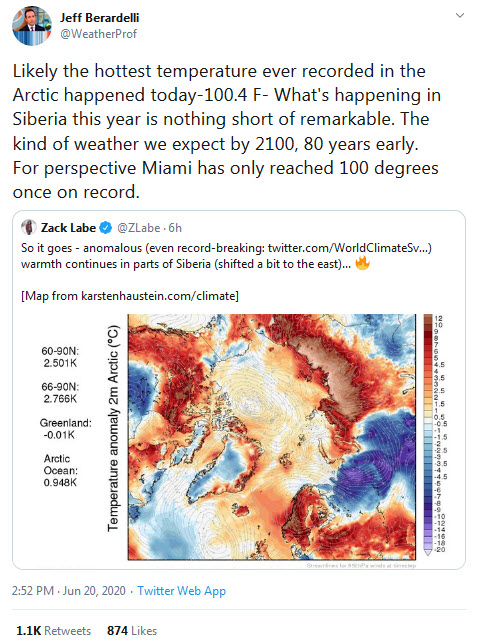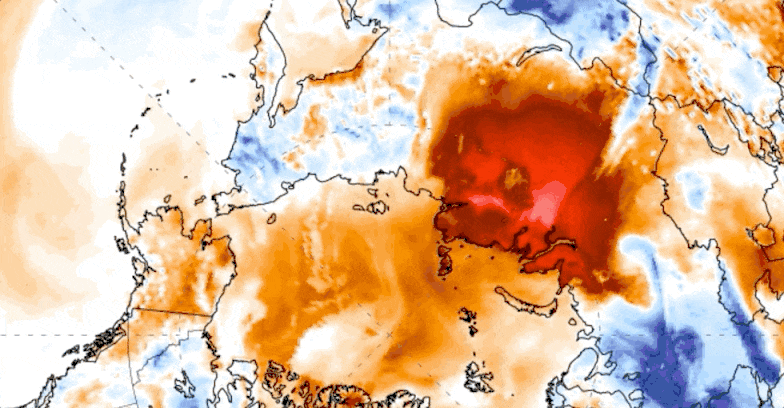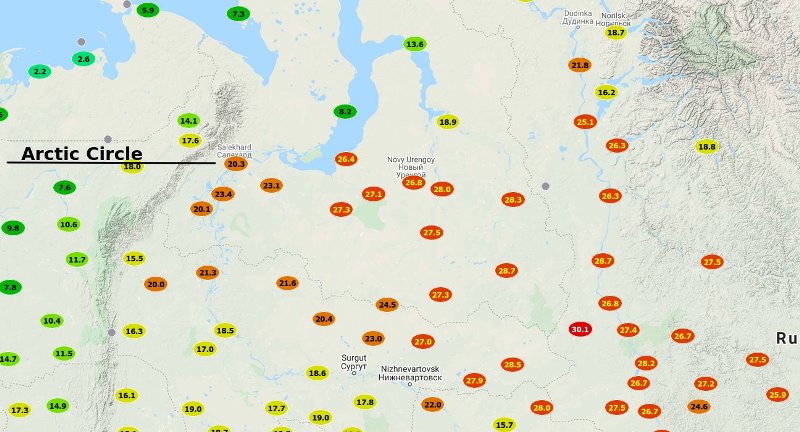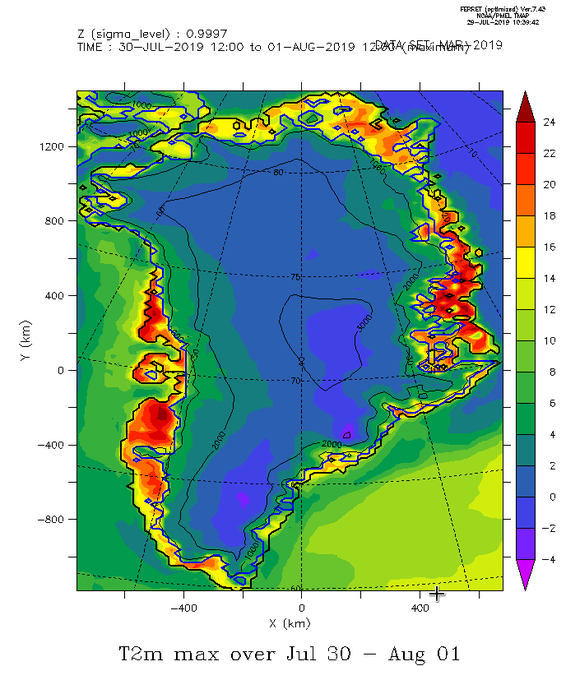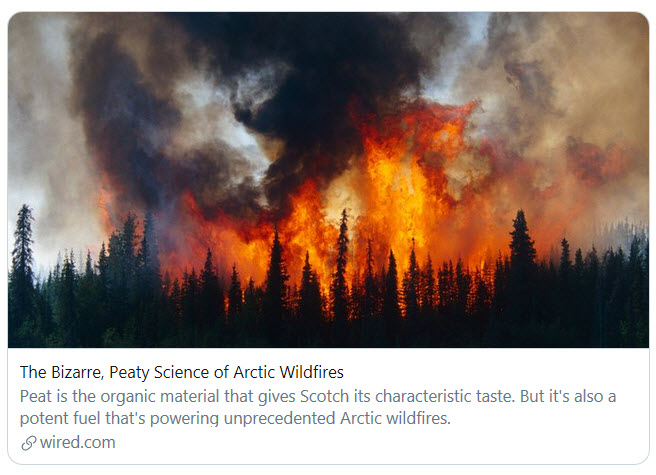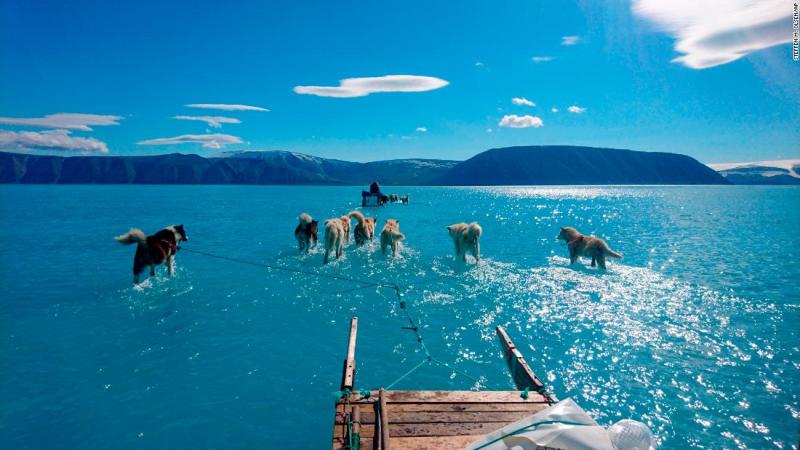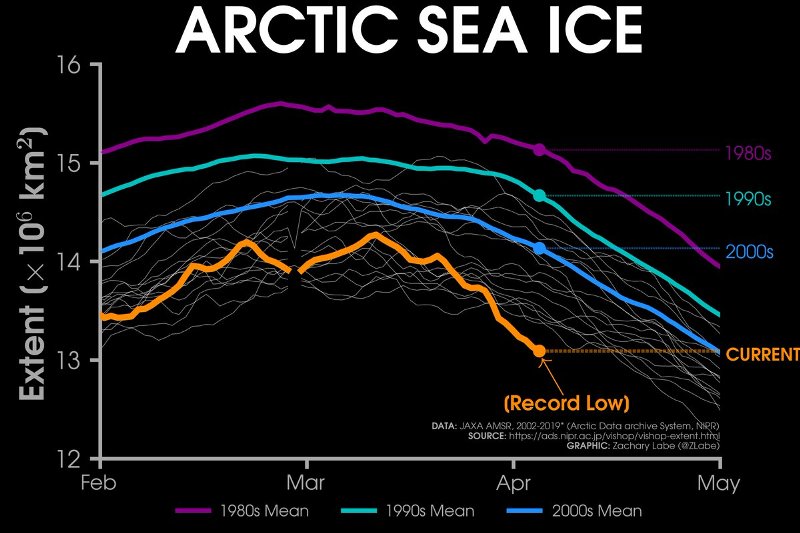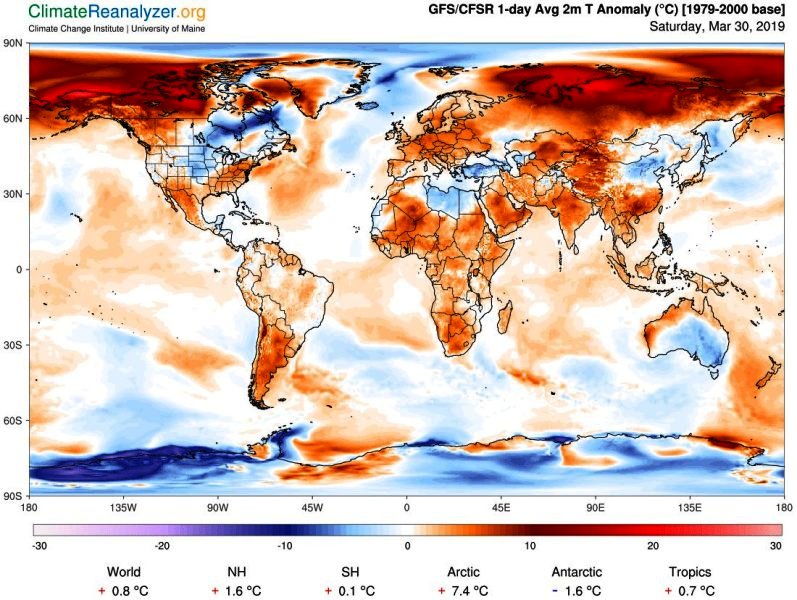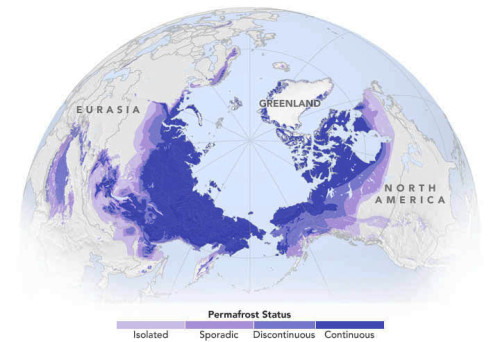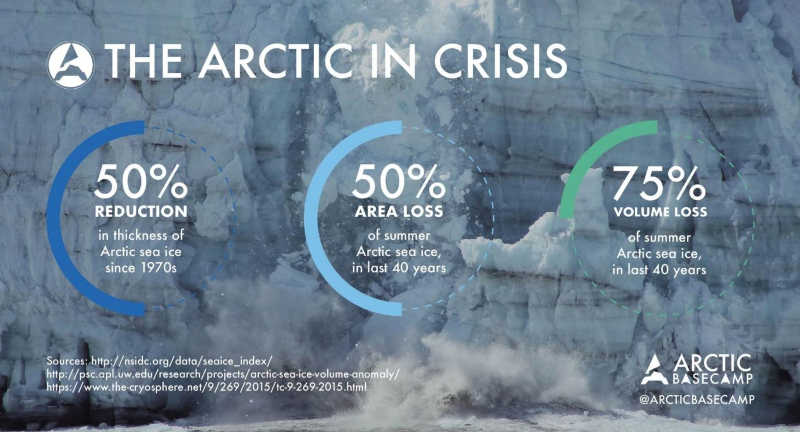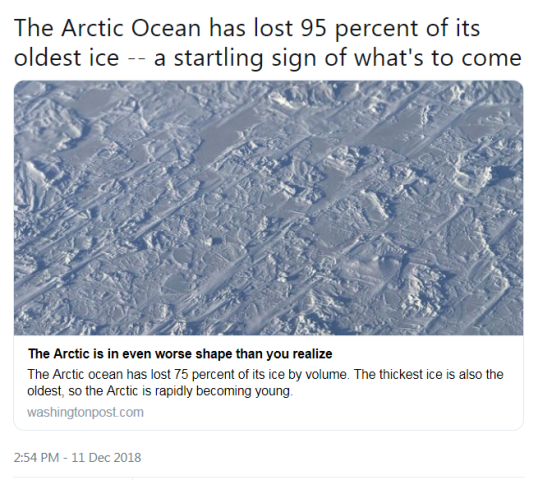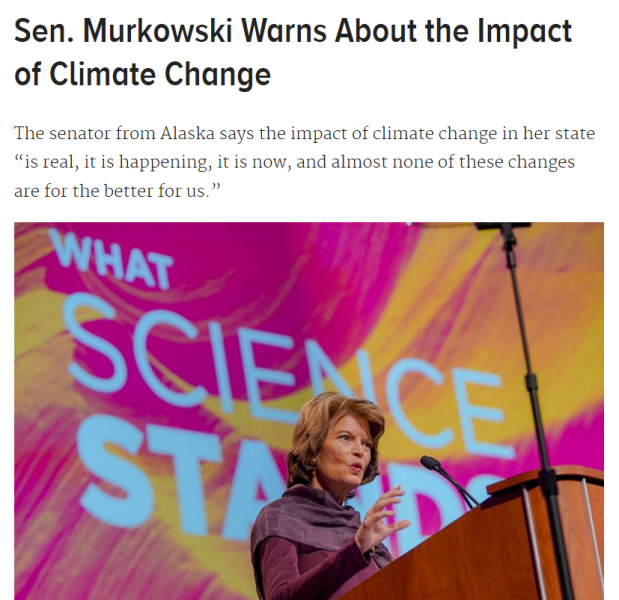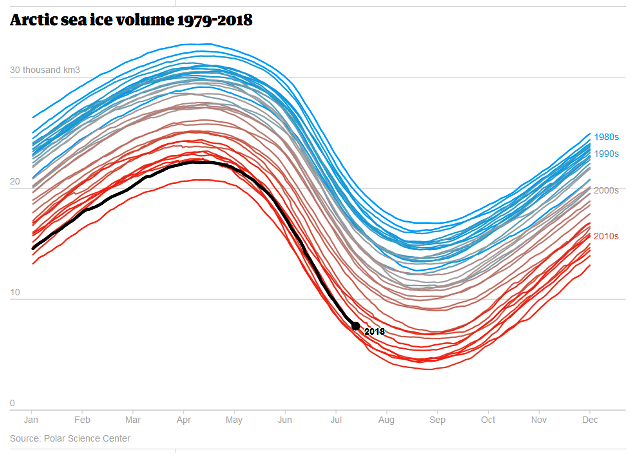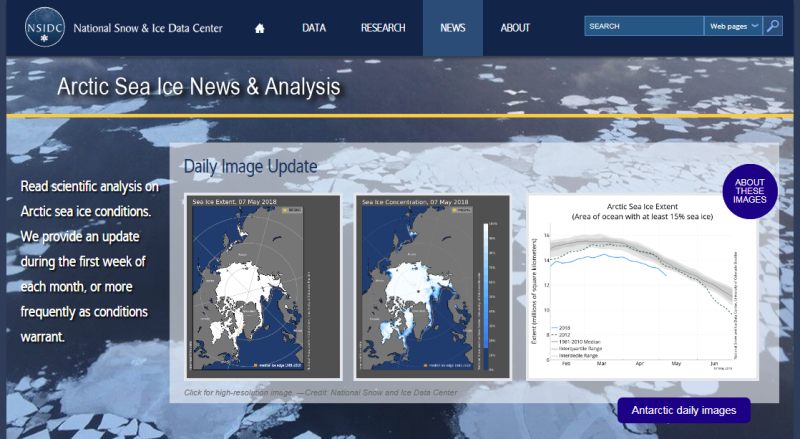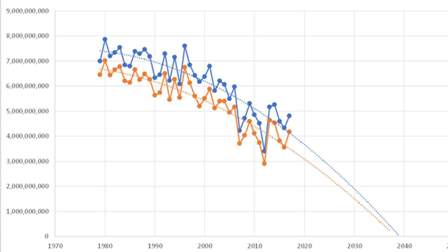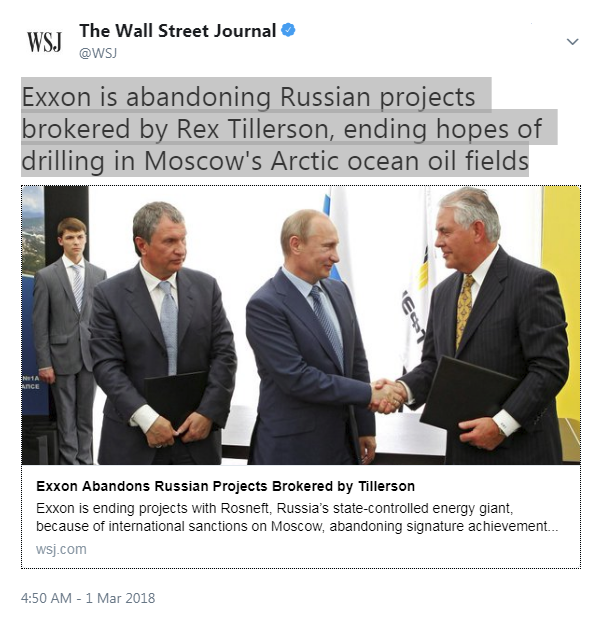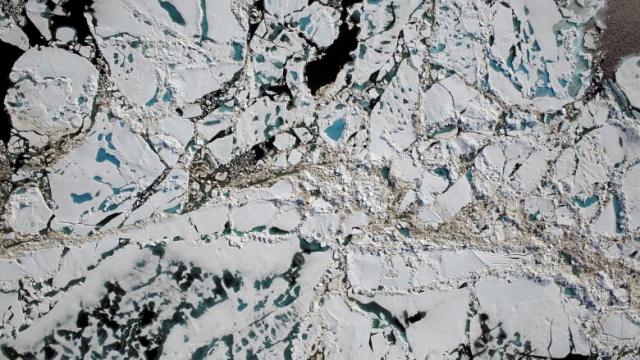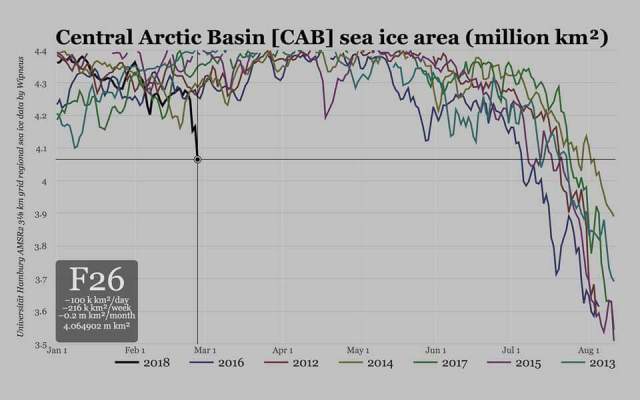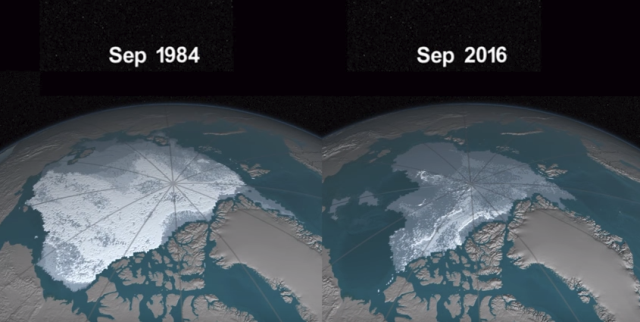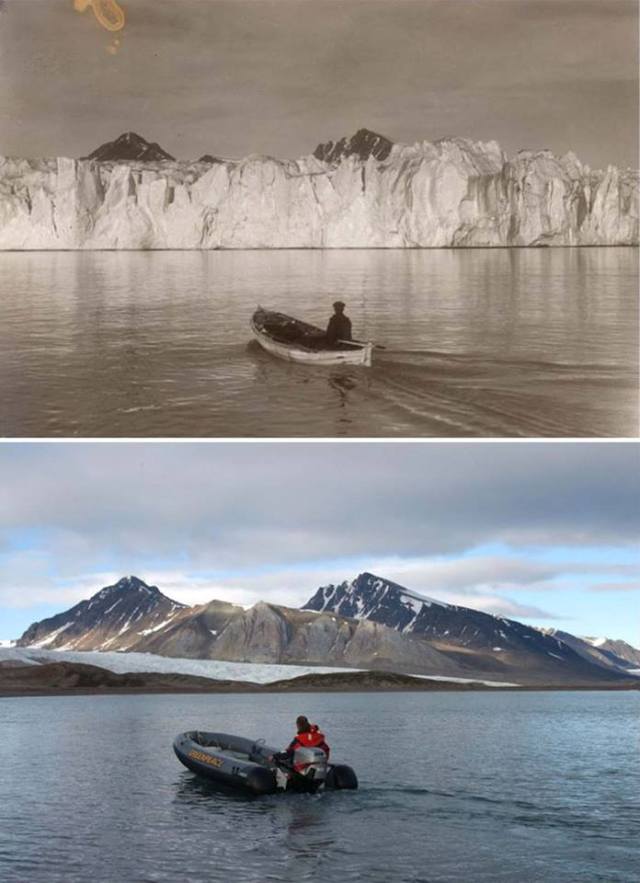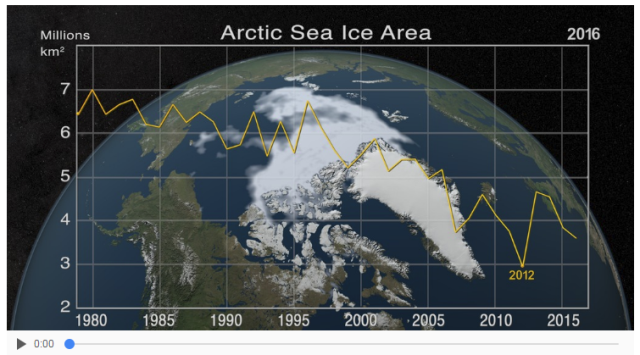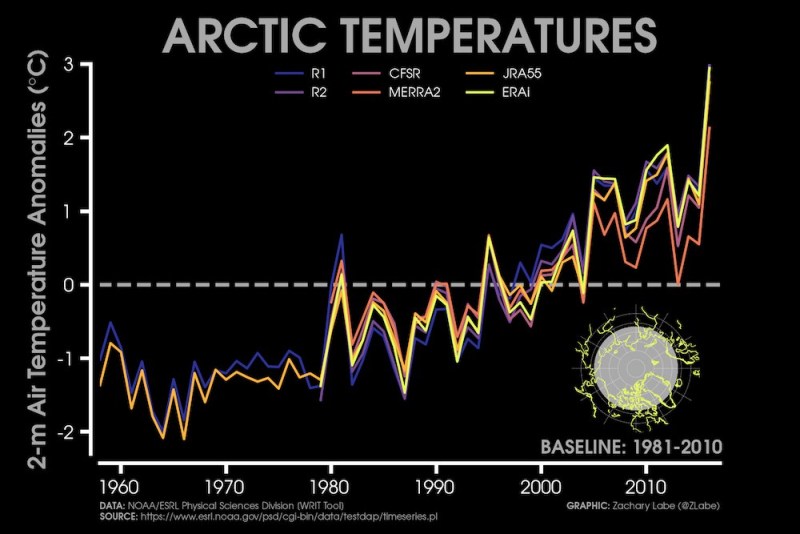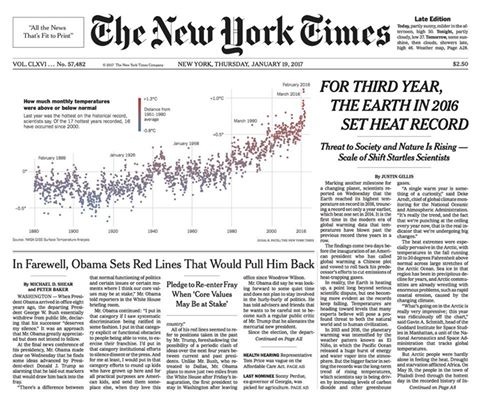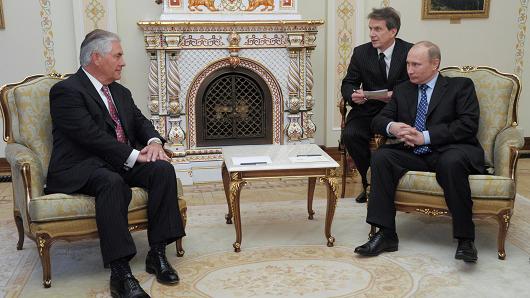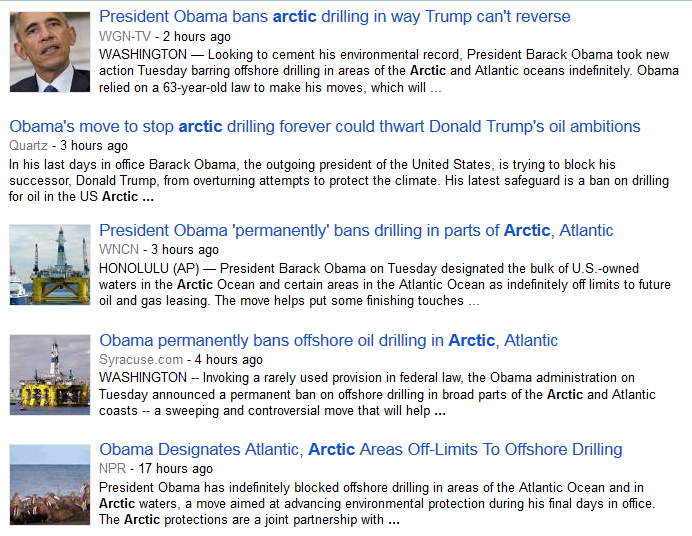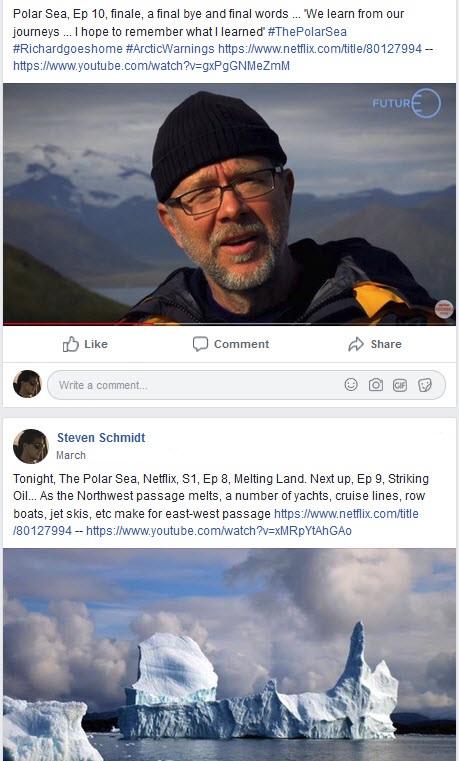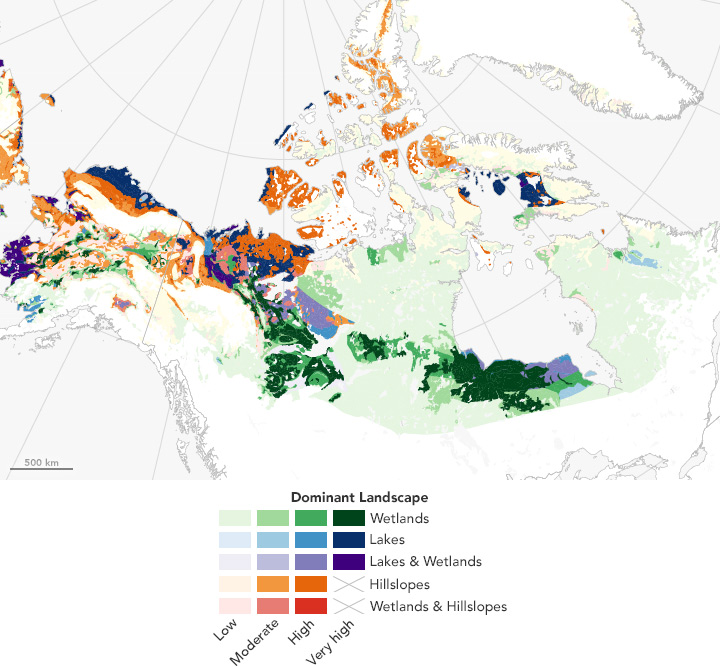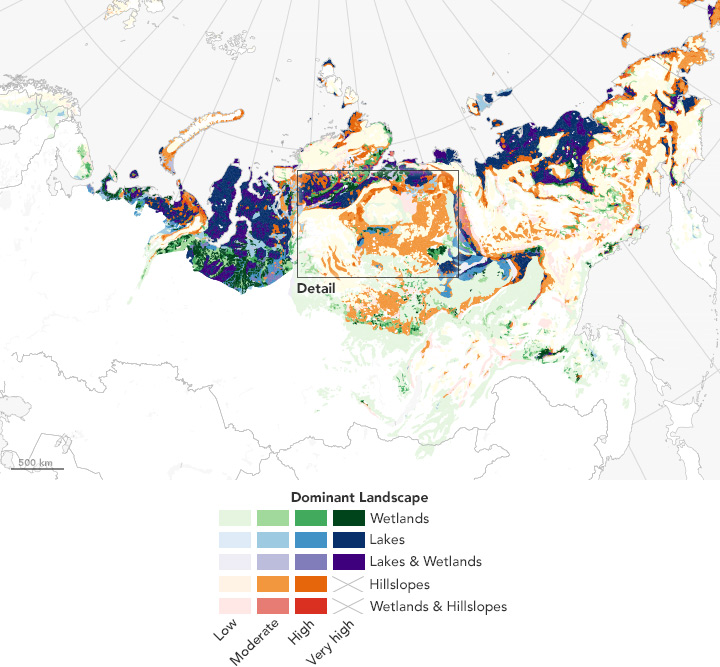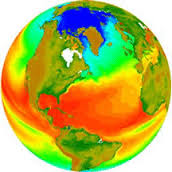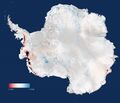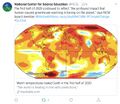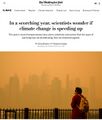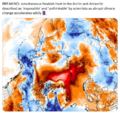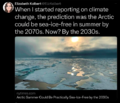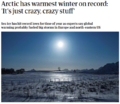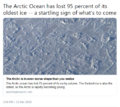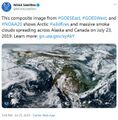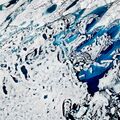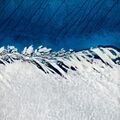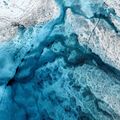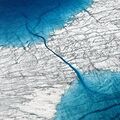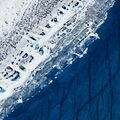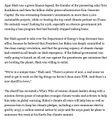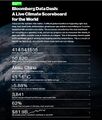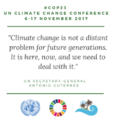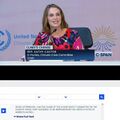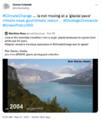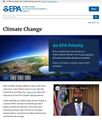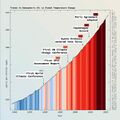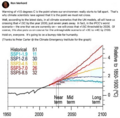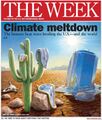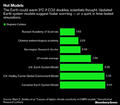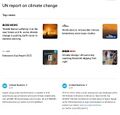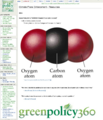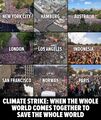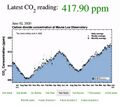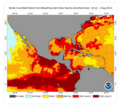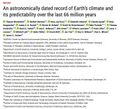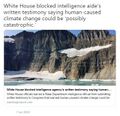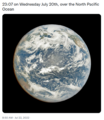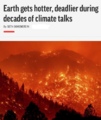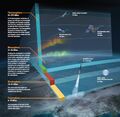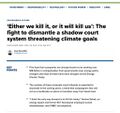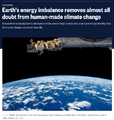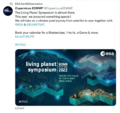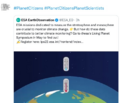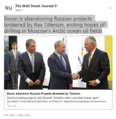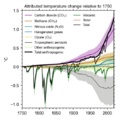Category:Arctic: Difference between revisions
Siterunner (talk | contribs) No edit summary |
Siterunner (talk | contribs) No edit summary |
||
| (17 intermediate revisions by the same user not shown) | |||
| Line 16: | Line 16: | ||
[[File:Climate change is not moving at a glacial pace.png|link=https://twitter.com/matthias_huss/status/1462052503525244931]] | : [[File:Climate change is not moving at a glacial pace.png|link=https://twitter.com/matthias_huss/status/1462052503525244931]] | ||
* https://twitter.com/mchanneling/status/1462376712226885635 | :* https://twitter.com/mchanneling/status/1462376712226885635 | ||
* https://twitter.com/i/status/1462052503525244931 | :* https://twitter.com/i/status/1462052503525244931 | ||
* https://climate.nasa.gov/climate_resources/4/graphic-dramatic-glacier-melt/ | :* https://climate.nasa.gov/climate_resources/4/graphic-dramatic-glacier-melt/ | ||
:[[File:Ice on edge of survival - Warming is changing the Arctic.png]] | |||
<big><big><big>'''2022'''</big></big></big> | |||
<big><big>'''''Climate graphic of the week: Arctic warming four times faster than rest of the planet'''''</big></big> | |||
* https://www.ft.com/content/9bb32c6f-b3dc-46bd-944e-9e583407b866 | |||
* https://www.nature.com/articles/s43247-022-00498-3 | |||
''Scientists have warned that the Arctic is warming four times faster than the rest of the planet, and at a higher rate than previously thought, according to new research, while the Antarctic ice is also diminishing.'' | |||
''The research on the Arctic, published in the academic journal Communications Earth and Environment, studies data from as far back as 1979 when Arctic temperature estimates from satellites became available.'' | |||
'''''[[Earth Science Research from Space]]''''' | |||
''Scientists have for a long time known that the Arctic is heating faster than the rest of the planet, but have not agreed on a rate. The warming effect, along with long-term declines in sea ice levels, are considered two major indicators of climate change.'' | |||
''The most recent landmark Intergovernmental Panel on Climate Change signed off by 234 scientists from more than 60 countries estimated that the Arctic was only warming around twice as fast as the rest of the planet. Global temperatures have risen at least 1.1C since pre-industrial times.'' | |||
''High sea temperatures are also causing diminishing sea ice in Antarctica, as temperatures rise in the Bellinghausen, Amundell and Weddell seas.'' | |||
''The new research comes as record-breaking heat was experienced across parts of the globe last month (July 2022), which ranked one of the three hottest on record.'' | |||
[[File:Arctic - Antarctic - Breaking.png]] | |||
<big><big>'''2021'''</big></big> | |||
<big><big>'''Arctic Report'''</big></big> | |||
'''Climate change transforming Arctic into ‘dramatically different state’''' | |||
''This year’s Arctic Report Card is the 16th annual volume of original, peer-reviewed environmental observations and analysis that documents rapid and dramatic shifts in weather, climate, terrestrial and oceanic conditions in the circumpolar region. Compiled by 111 scientists from 12 nations.'' | |||
''“The Arctic Report Card continues to show how the impacts of human-caused climate change are propelling the Arctic region into a dramatically different state than it was in just a few decades ago,” said NOAA Administrator Rick Spinrad, Ph.D. “The trends are alarming and undeniable. We face a decisive moment. We must take action to confront the climate crisis.”'' | |||
''Some of this year’s Arctic significant findings include:'' | |||
: ''The October-December 2020 period was the warmest Arctic autumn on record dating back to 1900. The average surface air temperature over the Arctic this past year (October 2020-September 2021) was the 7th warmest on record. The Arctic continues to warm more than twice as fast as the rest of the globe.'' | |||
: ''The snow-free period across the Eurasian Arctic during summer 2020 was the longest since at least 1990. June 2021 snow cover in Arctic North America was below the long-term average for the 15th consecutive year. June snow cover in Arctic Europe has been below average 14 of the last 15 years.'' | |||
: ''Following decades of relative stability, the Greenland ice sheet has now lost mass almost every year since 1998, with record ice loss in 2012 and 2019. In August, rainfall was observed at the Greenland ice sheet’s 10,500-foot summit for the first time ever.'' | |||
: ''The volume of post-winter sea ice in the Arctic Ocean in April 2021 was the lowest since records began in 2010. The amount of older, biologically important multiyear sea ice at the end of summer 2021 was the second-lowest since records began in 1985.'' | |||
: ''The total extent of sea ice in September 2021 was the 12th lowest on record. All 15 of the lowest minimum extents have occurred in the last 15 years. The substantial decline in Arctic ice extent since 1979 is one of the most iconic indicators of climate change.'' | |||
: ''The loss of sea ice has enabled shipping and other commercial and industrial activities to push deeper into the Arctic, in all seasons, resulting in more garbage and debris collecting along the shore and more noise in the ocean, which can interfere with the ability of marine mammals to communicate.'' | |||
: ''Some of the fastest rates of ocean acidification around the world have been observed in the Arctic Ocean. Two recent studies indicate a high occurrence of severe dissolution of shells in natural populations of sea snails, an important forage species, in the Bering Sea and Amundsen Gulf.'' | |||
“The Arctic story is a human story,” said Twila Moon, an Arctic scientist with the National Snow and Ice Data Center, and one of three editors of the 2021 Arctic Report Card. “We all have a role to play in creating the best possible outcomes for the region, its residents and all the citizens of the globe who depend on the Arctic as a critical component of our Earth system.” | |||
* http://www.noaa.gov/news-release/arctic-report-card-climate-change-transforming-arctic-into-dramatically-different-state | |||
······················································································································· | |||
<big>'''''The Arctic has a new record high temperature, according to the U.N.'''''</big> | |||
'''''"Alarm Bells"''''' | |||
* https://www.npr.org/2021/12/14/1064042128/arctic-heat-record-siberia-climate-change | |||
* https://news.un.org/en/story/2021/12/1107872 | |||
* https://www.bbc.com/news/science-environment-59649066 | |||
* https://www.themoscowtimes.com/2021/12/14/new-arctic-temperature-record-sounds-climate-alarm-un-a75812 | |||
········································ | |||
Courtesy of Jon Waterman | |||
December 7, 2021 | |||
Creative Commons | |||
<big><big>'''''Climate Changes at This National Park Stunned Me'''''</big></big> | |||
''By Jon Waterman'' | |||
''Mr. Waterman is a former national park ranger and the author of National Geographic’s [https://www.amazon.com/National-Geographic-Atlas-Parks/dp/142622057X '''“Atlas of the National Parks.”]''''' | |||
* https://www.nytimes.com/2021/12/07/opinion/climate-change-alaska.html | |||
''Secluded in the far-flung Gates of the '''Arctic National Park''' in northwestern Alaska, the flooded Noatak River pushed our raft downstream into a brisk wind. Caribou trails spider-webbed the hillsides, while cumulus clouds gathered like ripened fruit above a valley so vast that you could feel lost without binoculars and frequent map consultations.'' | |||
''To avoid crashing into the banks, I had to keep sharp eyes on the surging river and hands on the oars. Since extreme rainfall had lifted the river out of its banks (and delayed our floatplane flight in from Bettles, Alaska, for three days), every potential campsite had been sluiced over with silt and left soaking wet.'' | |||
'''''Thirty-six years had passed since I had last worked as a guide on the Noatak River'''''. ''This year, instead of simply enjoying a float down memory lane in the wildest country imaginable, I was stunned by how climate change had radically altered the place I once knew.'' | |||
''Drawn to wild places all my life for spiritual renewal, I had chosen the Noatak as the ultimate wilderness trip to share with my 15-year-old son, Alistair, and another family. I had also come to escape the record heat and forest fire smoke in Colorado for what I believed would be a cool interlude in the Far North.'' | |||
''To my surprise, the temperatures approached 90 degrees Fahrenheit for three consecutive days. The bugs were strangely thick. We had come in August hoping the frosts that usually began that month would have killed off the infamous clouds of mosquitoes. But climate change had lengthened the summers and delayed the cold, so we needed head nets and bug dope.'' | |||
''Alistair and I repeatedly cooled off by swimming in the river, an activity I had never considered during dozens of trips to the chilly North. But the last six years have seen some of the warmest weather on record in Alaska.'' | |||
''Since my first trip down those headwaters in 1982, temperatures in the Arctic have risen several degrees Fahrenheit. Back then, we dressed for winter in the first week of August. Soon afterward, though, scientists began to warn that the Arctic was warming at twice the global average. In the decades since, this part of Alaska has been subjected to abnormal heat waves and wildfires.'' | |||
''When a storm blew in on Aug. 5, temperatures dropped into the 50s and rain fell again as we floated out of Gates of the Arctic and into the Noatak National Preserve. The legislated wilderness shared between these two parks stretches more than 13 million acres, which makes it the nation’s greatest untrammeled landscape sheltering the largest unaltered river system. But the region’s protected status seems scant consolation given the cascade of climate change anomalies.'' | |||
''One of them is the thawing of the permafrost, the frozen ground that covers nearly a quarter of the Northern Hemisphere. I explained to Alistair that global warming has taken the permafrost out of the proverbial freezer. Eons of crustal earth movement, glacial scraping and soil deposition stirred and pushed ancient masses of plant life underground and flash-froze everything into permafrost before it could rot. More carbon is contained within this frozen ground than humankind has released since the Industrial Revolution began.'' | |||
''Now, it’s as if frozen spinach was left out on the kitchen counter. The permafrost has begun to decompose and emit carbon and methane into the atmosphere — adding to the human-generated greenhouse gases that are already causing planetary warming. | |||
The effects of the thawing were plain to see.'' | |||
''My feet mostly stayed dry on my tundra hikes in the 1980s; this time, we repeatedly soaked our boots walking across tundra drenched with weeping permafrost. The mountains above were bereft of snow. Year-round snow cover in Gates of the Arctic has all but disappeared. Of the 34 square miles of white snowfields seen in 1985, just four square miles remained by 2017, according to one study. | |||
On the Noatak, we had to steer our rafts wide around thawing riverbanks as stones fell and silt rained down into the river. Our drinking water filter repeatedly plugged up from the dislodged sediment.'' | |||
''The consequences pile on, in little ways and big ones.'' | |||
''A recent study of the area’s smaller rivers and streams found that the thawing permafrost is cooling the waters, which biologists say could hurt salmon reproduction. This raises long-term concerns for remote downstream communities that depend on salmon for sustenance. | |||
Flying in, we had also seen watery craters known as thermokarsts punched into the verdant tundra. They’re caused by the melting of surface ice on top of thawing permafrost. Lakes have flooded out of their basins, too, as the surrounding tundra walls have melted away like butter.'' | |||
''Woody shrubs are also moving north over the tundra and low grassy areas as the climate becomes more hospitable for them. The shrubs in turn transfer more of the sun’s heat through the snow and ground and into the permafrost. In 1982 I had discovered a den occupied by a family of wolves on a high bank of the Noatak amid knee-high dwarf birch and grass; today most of the river banks are festooned with head-high willows.'' | |||
''Since plants harbor a large part of the energy supply and habitat for wildlife, this “greening of the Arctic” is changing the entire ecosystem. Drawn by these woody shrubs, moose, beavers and snowshoe hares are now moving north and causing further alterations. Shrubs also reduce lichen cover, which is an essential food for over 250,000 caribou that pass through the region, some traveling up to 2,700 miles in their migration to and from their calving grounds.'' | |||
''For all of the changes we saw, we still reveled in a wilderness so remote and untraveled that we saw only one other person on our 90-mile, six-day trip from Pingo Lake to Kavachurak Lake. We caught grayling in the river and sautéed it for dinner while sheltering from the hot sun under a propped-up raft. We gorged on wild blueberries. For an hour in a bug-quelling wind atop a hillside we watched a grizzly and its cubs, unaware of our presence, cavort and splash across the tundra.'' | |||
''All this as caribou shepherded their young down from the summer calving grounds as they have done for thousands of years. We didn’t see many, but we knew they were out there, somewhere, cantering in synchronized, thousandfold troupes, inches apart yet never jostling one another, their leg tendons a veritable orchestra of clicking castanets, their hooves clattering on stones. These tawny creatures drift along their ancient trails like tendrils of smoke through one of our last great wild places.'' | |||
''These parks are an essential treasure of our democracy, conceived by Congress and presidents past as monuments for posterity. Now they offer a look at the future of climate change, which has slammed into the Arctic in ways not yet seen in the temperate world.'' | |||
''Unable to sleep one night, I slipped past my dozing son and emerged from our tent into the surreal soft light of a midnight sunset as a rainbow arced like an heaven-sent bridge over the river. In times like this I could only think about both of my sons and how they and all of our future generations will be left to face the uncertainties of an overheated planet.'' | |||
······················································· | |||
<big><big>'''November/October 2021'''</big></big> | |||
[[File:Norilsk in the Russian Arctic.jpg]] | |||
<big>'''''‘A Trash Heap for Our Children’ How Norilsk, in the Russian Arctic, Became One of the Most Polluted Places on Earth'''''</big> | |||
Via Inside Climate News | |||
* https://insideclimatenews.org/news/28112021/norilsk-nickel-russia-pollution/ | |||
························································································ | |||
<big>'''At the International Climate Summit in Glasgow'''</big> | |||
by Seth Borenstein @ the COP-26 / | |||
* https://apnews.com/article/climate-science-scotland-glaciers-greenland-f8a205b6e91ee496453d1a9c3fa4ea92 | |||
''The Arctic is warming three times faster than the rest of the planet and is on such a knife’s edge of survival that the U.N. climate negotiations underway in Scotland this week could make the difference between ice and water at the top of the world in the same way that a couple of tenths of a degree matter around the freezing mark, scientists say.'' | |||
''The fate of the Arctic looms large during the climate talks in Glasgow — the farthest north the negotiations have taken place — because what happens in the Arctic doesn’t stay in the Arctic. Scientists believe the warming there is already contributing to weather calamities elsewhere around the world.'' | |||
''“If we end up in a seasonally sea ice-free Arctic in the summertime, that’s something human civilization has never known,” said former NASA chief scientist Waleed Abdalati, who runs the University of Colorado’s environment program. “That’s like taking a sledgehammer to the climate system.”'' | |||
''What’s happening in the Arctic is a runaway effect.'' | |||
<big><big>'''September 2021'''</big></big> | |||
<big><big>'''What Happens in the North Doesn't Stay in the North'''</big></big> | |||
'''It's All Connected''' | |||
'''''Ben See (@ClimateBen) Tweeted:''''' | |||
'''''Hardly anybody on Earth knows that the Arctic is warming 3 to 4 times faster than the rest of the planet as its sea ice is destroyed during the abrupt climate change event of 20th/21st century capitalism. Radical action is required now in 2021. Nobody will be immune to this.''''' | |||
* https://t.co/MtYdR0FL47 | |||
* https://twitter.com/ClimateBen/status/1433793113252941827/photo/1 | |||
<big><big>'''August 2021'''</big></big> | |||
[[File:Energy Imbalance, Climate Change - Aug 1 2021.png]] | |||
<big><big>'''July 2021'''</big></big> | |||
[[File:Wavy Jet Stream by Patrick Mazza.jpg]] | |||
<big><big>It's All Connected</big></big> | |||
''You often hear [https://twitter.com/MichaelEMann @MichaelEMann] say the models underestimate the connection... a connection between climate change and a more amp’d - wavy jet... you can see how when we have a natural wavy jet pattern, which is very established this spring/summer, climate change impacts enhance it, by having more energy in the system (heat and moisture) magnifying extremes.'' | |||
* https://twitter.com/WeatherProf/status/1416370332638797824 | |||
* https://www.nature.com/articles/srep45242 | |||
''Jennifer Francis of Woods Hole Research Institute drew the connection back in 2015. Viewing an increase in jet stream waviness, she and fellow authors concluded, “These results suggest that as the Arctic continues to warm faster than elsewhere in response to rising greenhouse-gas concentrations, the frequency of extreme weather events caused by persistent jet-stream patterns will increase...”'' | |||
'' | ''Some models which emphasize Arctic heating show a tripling by the end of the century. But if we can keep global heating under 2°C/3.6°F, we can likely avert those increases.'' | ||
''The | ''This is why we need dramatic reductions in burning coal, oil and natural gas beginning immediately, as well as in deforestation, another significant source of climate pollution. The emergence of radical impacts demands radical action. Business as usual is done. If we want to leave a world with which our children can cope, when the capacity of humanity and nature to adapt is stressed beyond the breaking point, we need to rise up as people and demand change now.'' | ||
* https://iopscience.iop.org/article/10.1088/1748-9326/10/1/014005 | |||
| |||
·································································································· | |||
'''Via Zachary Labe/UCI - https://sites.uci.edu/zlabe/arctic-sea-ice-figures/''' | |||
Observations and global climate model experiments identifying linkages between Arctic climate change (especially due to sea ice) and large-scale atmospheric circulation in the mid-latitudes. | |||
* https://twitter.com/ZLabe/status/1415661835269808133 | |||
[https://sites.uci.edu/zlabe/files/2021/04/SeaIceTrends.gif Arctic Sea Ice Extent (1979-2020) - GIF] | |||
[https://cpb-us-e2.wpmucdn.com/sites.uci.edu/dist/2/2231/files/2021/02/IceAlbedo_AA_moving.gif Changes in Annual Surface Air Temperature (1979-2020) - GIF] | |||
[https://cpb-us-e2.wpmucdn.com/sites.uci.edu/dist/2/2231/files/2021/02/ArcticAmplification.gif Changes in Annual Arctic Temperature and Sea Ice Extent (1979-2020) GIF] | |||
[https://sites.uci.edu/zlabe/arctic-sea-ice-figures/ Arctic Temperature Anomalies (1979-2020) - GIF] | |||
[https://cpb-us-e2.wpmucdn.com/sites.uci.edu/dist/2/2231/files/2019/09/SIBT1850_1918-2017_SIC.gif Arctic Annual Sea Ice - Past 100 Years - GIF] | |||
<big><big>'''June 2021'''</big></big> | |||
[[File:Arctic Siberia Heatwave - Again - June 2021.jpg]] | |||
<big>'''''Ground Temperatures Hit 118 Degrees in the Arctic Circle'''''</big> | |||
* https://gizmodo.com/ground-temperatures-hit-118-degrees-in-the-arctic-circl-1847144505 | |||
''The 118-degree-Fahrenheit temperature was measured on the ground in Verkhojansk, in Yakutia, Eastern Siberia, by the European Space Agency’s Copernicus Sentinel satellites.'' | |||
* https://www.copernicus.eu/en/media/image-day-gallery/land-surface-temperature-sakha-republic | |||
<big>'''Norway taken to Court over drilling in the Arctic'''</big> | |||
* https://www.theguardian.com/world/2021/jun/16/climate-activists-take-norway-european-human-rights-court-arctic-oil-drilling-plans | |||
'' | <big>'''The People vs. Arctic Oil'''</big> | ||
* https://www.reuters.com/business/environment/the-people-vs-arctic-oil-climate-activists-target-norway-human-rights-court-2021-06-15/ | |||
:····························································· | |||
'''Follow the MOSAIC Expedition into the Arctic''' | |||
* https://follow.mosaic-expedition.org/ | |||
| |||
:····························································· | |||
<big><big>'''May 2021'''</big></big> | |||
[ | [[File:Arctic Melt - 1950-2020.png]] | ||
| |||
<big><big>'''April 2021'''</big></big> | |||
:::[[File:Timelapse in Google Earth-4.jpg]] | |||
| |||
<big><big><big>'''Timelapse from Google Earth'''</big></big></big> | |||
<big>'''Welcome to Timelapse!'''</big> | |||
'''Rebecca Moore, Director, Google Earth, Earth Engine & Outreach:''' | |||
'' | ''To explore Timelapse in Google Earth, go to [https://earth.google.com/web/@41.98486546,-87.91260108,195a,24634d,35y,0h,0t,0r/data=CjISMBIgNTQ0MGExNzMxYzI1MTFlYTk0NDM4YmI2ODk0NDUyOTciDG1haW5Ob1JhbmRvbQ g.co/Timelapse] — choose any place on the planet where you want to see time in motion.'' | ||
<big><big><u>'''[[Google Earth Timelapse]]'''</u></big></big> | |||
: Launch Date: April 15, 2021 | |||
* http://goo.gle/timelapse | |||
:·································· | |||
<big><big><big>'''The Carbon Mapper Partnership'''</big></big></big> | |||
<big>'''Welcome to the Carbon Mapper Program'''</big> | |||
::[https://carbonmapper.org/ <big><big><u>'''Carbon Mapper'''</u></big></big>] | |||
::[[File:Planet 4-15-2021 10-22-51 AM.jpg]] | |||
: | :''NASA’s Earth sciences mission --- focused on supporting a strong, data-driven response to the climate crisis.'' | ||
:::::'''[[Planet API]]''' --- '''[[Earth Science Research from Space]]''' --- '''[[Earth Science Vital Signs]]''' | |||
<big><big>'''March 2021'''</big></big> | |||
''(CNN) Russia launched its space satellite Arktika-M on Sunday on a mission to monitor the climate and environment in the Arctic amid a push by the Kremlin to expand the country's activities in the region.'' | |||
''The Arctic has warmed more than twice as fast as the global average over the last three decades and Moscow is seeking to develop the energy-rich region, investing in the Northern Sea Route for shipping across its long northern flank as ice melts.'' | |||
''The satellite successfully reached its intended orbit after being launched from Kazakhstan's Baikonur cosmodrome by a Soyuz rocket, Dmitry Rogozin, the head of Russia's Roscosmos space agency, said in a post on Twitter.'' | |||
''Russia plans to send up a second satellite in 2023 and, combined, the two will offer round-the-clock, all-weather monitoring of the Arctic Ocean and the surface of the Earth, Roscosmos said.'' | |||
:::[[File:Russian satellite to monitor climate in the Arctic.jpg]] | |||
<big><big>'''February 2021'''</big></big> | |||
'' | <big><big>'''Arctic 'Polar Vortex' Visits Texas'''</big></big> | ||
What happens in the Arctic doesn't stay in the Arctic | |||
* https://scholar.google.com/scholar?hl=en&as_sdt=0,10&qsp=8&q=polar+vortex+extreme+weather&qst=br | |||
[https://www.greenpolicy360.net/w/Special:RecentChanges <font color=gray><big><big>'''''Top of the News @GreenPolicy360'''''</big></big></font>] | |||
: | :::[https://www.theatlantic.com/ideas/archive/2021/02/freezing-cold-and-burning-mad-texas/618048/ <big><big>'''''Freezing Cold in Texas (& Don't Blame Texas Wind Farms)'''''</big></big>] | ||
::[[File:Austin Texas is connected to the Arctic - February 2021.jpg]] | |||
::<big>'''''Texas not prepared for a 'Polar Vortex' era '''''</big> | |||
:: | :::<big>'''''More on the storm & Texas oil/gas politics'''''</big> | ||
:: | :::* https://www.greenpolicy360.net/w/Green_Stories_of_the_Day | ||
:::* https://www.greenpolicy360.net/w/Earth_and_Space,_Politics | |||
:::* https://www.greenpolicy360.net/w/GreenPolicy360-eOS | |||
| |||
<big><big>'''January 2021'''</big></big> | |||
'''''World's ice melting faster than ever''''' | |||
* https://www.wsj.com/amp/articles/worlds-ice-is-melting-faster-than-ever-climate-scientists-say-11611565200 | |||
'' | ''From Antarctica to the Arctic, the world’s ice is melting faster than ever, according to a new global satellite survey that calculated the amount of ice lost from a generation of rising temperatures.'' | ||
'' | ''Between 1994 and 2017, the Earth lost 28 trillion metric tons of ice, the survey showed. That is an amount roughly equivalent to a sheet of ice 100 meters thick covering the state of Michigan or the entire U.K.'' | ||
'' | ''“It’s such a huge amount it’s hard to imagine it,” said Thomas Slater, a research fellow at the U.K.’s University of Leeds Centre for Polar Observation and Modelling and the lead author of a paper describing the new research. | ||
* https://insideclimatenews.org/news/25012021/global-ice-loss-sea-level-rise | |||
''From the polar caps to the glaciers of Europe, Asia and South America, global warming is melting the planet’s ice faster than ever and speeding the inundation of the world’s coastlines.'' | |||
''New research shows the annual melt rate grew from 0.8 trillion tons in the 1990s to 1.3 trillion tons by 2017, and has accelerated most in the places with the most ice—the Greenland and Antarctic ice shelves and sheets.'' | |||
''Those massive systems of land and sea-based ice are melting as fast as the worst-case climate scenarios in major global climate reports, said Thomas Slater, a co-author of the new study in The Cryosphere that measured the meltdown from 1994 to 2017, which covers a timespan when every decade was warmer than the previous one and also includes the 20 warmest years on record.'' | |||
* https://www.livescience.com/amp/greenland-ice-loss-threshold-2055.html | |||
''Greenland careening ice loss...'' | |||
○ | |||
<big>'''Novatek now shipping LNG through the Northern Sea Route'''</big> | |||
'''Ice-free, the Arctic opens to ship more global warming gas''' | |||
* https://www.highnorthnews.com/en/new-dawn-arctic-shipping-winter-transits-northern-sea-route | |||
<big><big>'''December 2020'''</big></big> | |||
<big>'''Polar-ward climate zones shift and consequent tipping points'''</big> | |||
''by Andrew Glikson'' | |||
''The concept of a global climate tipping point/s implies a confluence of climate change processes in several parts of the world where regional climate changes can combine as a runaway shifts to a new climate state. Conversely the shift of climate zones can constitute the underlying factor that triggers extreme weather events which culminate in tipping points. These shifts include the expansion of the tropics, tropical cyclones, mid-latitude storms and weakening of boundaries of the polar vortex, allowing breach of air masses of contrasting temperatures through the jet stream polar boundary, with ensuing snow storms and heatwaves.'' | |||
'''Read more about ... observations of the "weakening of boundaries of the polar vortex", in other words, it's all connected...''' | |||
<big>What happens in the North doesn't stay in the North</big> | |||
* https://arctic-news.blogspot.com/2020/12/polar-ward-climate-zones-shift-and-consequent-tipping-points.html | |||
🌎 | |||
* https://www. | * https://www.france24.com/en/live-news/20201208-arctic-endured-one-of-its-hottest-years-in-2020-study | ||
* https://www.nytimes.com/2020/12/08/climate/arctic-climate-change.html | |||
'' | <big><big>'''November/October 2020'''</big></big> | ||
* https://www.arctictoday.com/the-u-s-heavy-duty-coast-guard-icebreaker-polar-star-will-make-a-winter-voyage-to-arctic-alaska/ | |||
''With ability to break through ice that is up to 21 feet thick, the Polar Star will be able to handle winter ice in the Chukchi and Beaufort... territory where the Coast Guard icebreaker Healy usually sails — but its Alaska operations are conducted in summer and fall, when the sea ice is low. “The Polar Star is a much more capable icebreaker. It’s older, but it’s capable of powering through thicker, older ice.”'' | |||
'' | ''The Polar Star’s exact mission in Alaska waters this winter has yet to be determined, Cangemi said. There are hopes that the ship will be able to support some of the scientific research that would have been done this year from the Healy but was not carried out...'' | ||
<big><big>'''September 2020'''</big></big> | |||
'' | '''Warming shrinks Arctic Ocean ice to 2nd lowest on record''' | ||
by Seth Borenstein, Science Writer / Associated Press | |||
* https://apnews.com/0bc59d6a22447ba3cdef2968276d8a7a | |||
'''A Farewell to Arctic Ice''' | |||
The Guardian | |||
* https://www. | * https://www.theguardian.com/environment/2016/aug/21/arctic-will-be-ice-free-in-summer-next-year | ||
'''Ice Sheet Melt Worst Case Scenario''' | |||
* https://www.sciencealert.com/ice-sheet-melting-is-perfectly-in-line-with-our-worst-case-scenario-scientists-warn | |||
'' | <big><big>'''August 2020'''</big></big> | ||
''' | [https://amp.cnn.com/cnn/2020/08/20/weather/greenland-ice-sheet-melt-climate-intl-hnk/index.html '''Greenland's ice sheet melted faster than ever before in 2019, study says. Worrying news for coastal cities''' / CNN] | ||
* https://www.nature.com/articles/s43247-020-0010-1 | |||
''Greenland's ice sheet lost an annual record of 532 billion tons of ice, with 223 billion tons of ice lost during the month of July alone. | |||
To put that in comparison, between 2003 and 2016 the ice sheet lost about 255 billion tons of ice on average -- per year. | |||
"We have documented another record loss year for Greenland," said Ingo Sasgen, a glaciologist at the Alfred Wegener Institute for Polar and Marine Research and co-author of the study.'' | |||
''"What this shows is that the ice sheet is not only out of balance but it's increasingly likely to produce more and more extreme loss years."'' | |||
''The report follows another study published last week that found Greenland's ice sheet has '''melted to a point of no return''', and is retreating in rapid bursts, leading to a sudden and unpredictable rise in sea levels.'' | |||
| |||
<big> | <big>In Memory of Planet Citizen Konrad Steffen</big> | ||
Renowned climate scientist dies in Greenland ice sheet accident | |||
* https://www.usatoday.com/story/news/nation/2020/08/13/konrad-steffen-death-climate-change-scientist-dies-greenland/3362486001/ | |||
* https://www.cbsnews.com/news/konrad-steffen-koni-climate-scientist-dies-greenland-ice-sheet-crevasse/ | |||
* https://www.nytimes.com/2020/08/13/climate/konrad-steffen-dead.html | |||
* https://www.dailycamera.com/2020/08/10/konrad-steffen-former-cires-director-dies-in-greenland-accident/ | |||
* https://twitter.com/algore/status/1292979399005024256 | |||
In 2017, Konrad Steffen talks about the Polar Research Station, climate change and the Greenland landscape | |||
* https://www.youtube.com/watch?v=emHW-GKBIfk | |||
''' | '''The Tipping Point in Greenland, Past the Point of No Return''' | ||
* https://www.sciencealert.com/greenland-s-melting-ice-sheet-has-passed-the-point-of-no-return-scientists-say/ | |||
* https:// | * https://amp.cnn.com/cnn/2020/08/20/weather/greenland-ice-sheet-melt-climate-intl-hnk/index.html | ||
''' | '''Tipping Point Reached 20 Years Ago''' | ||
* https:// | * https://phys.org/news/2020-09-greenland-ice-sheet-years.amp | ||
'''New study warns: We have underestimated pace at which the Arctic is melting''' | |||
by [https://phys.org/news/2020-08-underestimated-pace-arctic.html Niels Bohr Institute] | |||
''Temperatures in the Arctic Ocean between Canada, Russia and Europe are warming faster than researchers' climate models have been able to predict.'' | |||
''Over the past 40 years, temperatures have risen by one degree every decade, and even more so over the Barents Sea and around Norway's Svalbard archipelago, where they have increased by 1.5 degrees per decade throughout the period.'' | |||
''This is the conclusion of a new study published in Nature Climate Change.'' | |||
'' | ''"Our analyses of Arctic Ocean conditions demonstrate that we have been clearly underestimating the rate of temperature increases in the atmosphere nearest to the sea level, which has ultimately caused sea ice to disappear faster than we had anticipated," explains Jens Hesselbjerg Christensen, a professor at the University of Copenhagen's Niels Bohr Institutet (NBI) and one of the study's researchers.'' | ||
<big>'''July 2020'''</big> | |||
'' | <big>''' 'Another Ice Sheet Disintegrates' '''</big> | ||
''Scientists from the National Snow and Ice Data Centre (NSIDC) at the University of Colorado Boulder initially predicted the disappearance of the St. Patrick Bay ice caps would take place over five years, but it's actually only taken three.'' | |||
''The frozen sheets, probably in place for several centuries, measured more than 10 square kilometres (3.86 square miles) combined at the end of the 1950s, and have now shrunk down to nothing. It's a sign of the climate change that's gaining momentum all around the world, and showing no signs of stopping.'' | |||
<big>''' Take the Ice-free Northern Route'''</big> | |||
* https://www. | * https://www.bloomberg.com/graphics/2020-arctic-sea-ice-crossing/ | ||
···················································································· | |||
[https://edition.cnn.com/2020/07/10/europe/arctic-oil-spill-russia-whistleblower-intl/index.html '''Arctic oil spill catastrophe'''] | |||
Russian whistleblower risking it all to expose the scale of the disaster. Environmentalists calling it the worst ecological catastrophe in the polar Arctic. | |||
···················································································· | |||
Arctic warming? "More like three times the global mean." -- Dr. Gavin Schmidt | |||
* https:// | * https://twitter.com/ClimateOfGavin/status/1276603997915426816 | ||
* https:// | * Gavin Schmidt (@ClimateOfGavin) | https://twitter.com/ClimateOfGavin | ||
* https://en.m.wikipedia.org/wiki/Gavin_Schmidt | |||
<big>'''June 2020'''</big> | |||
'''A Disastrous Summer in the Arctic''' | |||
* https://www.newyorker.com/news/annals-of-a-warming-planet/a-disastrous-summer-in-the-arctic | |||
'' | '''Weather Report: Siberia is Hot, Really Hot''' | ||
* https://mobile.twitter.com/WeatherProf/status/1274414907086245890 | |||
* https://www.cbsnews.com/news/arctic-records-its-hottest-temperature-ever-2020-06-20/ | |||
''Alarming heat scorched Siberia on Saturday (June 20, 2020) as the small town of Verkhoyansk (67.5°N latitude) reached 100.4 degrees Fahrenheit, 32 degrees above the normal high temperature... this is likely the hottest temperature ever recorded in Siberia and also the hottest temperature ever recorded north of the Arctic Circle, which begins at 66.5°N.'' | |||
[[File:Arctic-Siberia-6-20-2020.jpg]] | |||
| |||
'' | '''Greenland: 'Yuge Changes' in 'Human Time' ''' | ||
* https://www.greenpolicy360.net/w/Category:Greenland | |||
''''New Arctic': Wildlife Migrations & Shifting Patterns as the Arctic Warms''' | |||
:Arctic / 'New North' Photo Essay | |||
:* https://thenarwhal.ca/climate-new-north/ | |||
| |||
<big>'''May 2020'''</big> | |||
[[File:Arctic heat in Russia-Siberia 2020.gif]] | |||
<big>'''Earlier this week in Siberia up to 86 degrees F. (30.1 C.)'''</big> | |||
Arctic | The Arctic is ... 'Freakishly Warm' | ||
''The Arctic has been on one recently. Russia had its hottest winter ever recorded, driven largely by Siberian heat. That heat hasn’t let up as the calendar turns to spring. In fact, it’s intensified and spread across the Arctic. Last month was the hottest April on record for the globe, driven by high Arctic temperatures that averaged an astounding 9.4 degrees Celsius above normal, according to [https://data.giss.nasa.gov/gistemp/maps/index_v4.html NASA data...]'' | |||
''Large parts of Russia were anywhere from 6 to 8 degrees Celsius hotter than normal, according to data kept by Russia’s weather service. That smashes the previous record set in the winter of 2015-16 by 1.3 degrees Celsius. Amid the widespread heat were major records in places like Moscow, which barely got a winter at all this year.'' | |||
[[File:Arctic 30.1 C at 62.5 N.jpg]] | |||
························ | |||
''' | <big>'''April 2020'''</big> | ||
'''Shell Abandons Arctic Drilling Agreement with Russia''' | |||
* https://thebarentsobserver.com/en/industry-and-energy/2020/04/shell-pulls-out-russian-arctic-deal | |||
<big>'''March 2020'''</big> | |||
''' | <big>'''Oil/Gas Stock Prices Continue to Plunge'''</big> | ||
Fossil Fuels Demand Continues Its Historic Fall | |||
Gasoline Demand Falls Most Ever | |||
* https://www.cnbc.com/amp/2020/04/01/the-other-bomb-thats-dropping-cramers-warning-as-first-shale-company-files-for-chapter-11.html | |||
: | * https://mobile.reuters.com/article/amp/idUSKBN21J3RE | ||
* https://www.msn.com/en-us/finance/markets/saudis-boost-oil-output-defying-trump-e2-80-99s-plea-to-end-price-war/ar-BB120I0d | |||
* https://www.cnbc.com/2020/04/01/gop-sen-dan-sullivan-calls-on-saudis-to-end-its-oil-price-war.html | |||
* https://finance.yahoo.com/news/trump-meet-oil-executives-reeling-190014896.html | |||
'''This could go even lower': Oil prices plunge to 17-year lows as demand drop threatens to overwhelm storage facilities''' | |||
* https://markets.businessinsider.com/commodities/news/crude-oil-prices-plunge-price-war-storage-and-coronavirus-fears-2020-3-1029043473 | |||
Crude oil prices tanked as continued fears over the coronavirus pandemic slammed energy demand. | |||
<big>'''February 2020'''</big> | |||
'' | <big><big>The Arctic Is Warming 'Twice As Fast' As Other Areas of the Planet</big></big> | ||
* https://www.wired.com/story/arctic-greening/ | |||
''BP 'Reimagining Energy' ... | |||
''The world’s carbon budget is finite and running out fast; we need a rapid transition to net zero.'' -- ''Bernard Looney, BP chief executive officer'' | |||
* https://www.tampabay.com/opinion/2020/02/14/hold-bp-to-pledge-on-cutting-emissions-editorial/ | |||
* https://www.bloomberg.com/news/articles/2020-02-11/why-company-carbon-cuts-should-include-scope-check-quicktake | |||
* https://climatereality.com/blog/actions-vs-words-look-fossil-fuel-greenwashing | |||
* https:// | * https://www.greenpolicy360.net/w/Climate_News | ||
<big>'''January 2020'''</big> | |||
<big>''' 'Thermokarst' '''</big> | |||
''Permafrost Is Thawing So Fast, It’s Gouging Holes in the Arctic'' | |||
''Normally, these terrains of frozen soil thaw gradually. But in some places, it’s thawing so abruptly that landscapes are collapsing in on themselves'' | |||
Via Nature Geoscience | |||
* https:// | * https://www.wired.com/story/abrupt-permafrost-thaw/ | ||
<big><big>''' December 2019'''</big></big> | |||
''' | '''''2019 Arctic Report Card''''' | ||
* https:// | * https://arctic.noaa.gov/Report-Card | ||
''The average annual land surface air temperature north of 60° N for October 2018-August 2019 was the second warmest since 1900. The warming air temperatures are driving changes in the Arctic environment that affect ecosystems and communities on a regional and global scale.'' | |||
''The Greenland Ice Sheet is losing nearly 267 billion metric tons of ice per year and contributing to global [https://www.greenpolicy360.net/w/Sea-Level_Rise sea-level rise.]'' | |||
[https://news.uci.edu/2019/12/19/greenland-ice-loss-is-at-worse-case-scenario-levels-study-finds/ Greenland ice sheet loss at 'worst-case' scenario] | |||
''North American Arctic snow cover in May 2019 was the fifth lowest in 53 years of record. June snow cover was the third lowest.'' | |||
''Tundra greening continues to increase in the Arctic, particularly on the North Slope of Alaska, mainland Canada, and the Russian Far East.'' | |||
'''''Trump: It's a Hoax''''' | |||
* https://www.scientificamerican.com/article/more-and-more-links-are-emerging-between-warming-and-extreme-weather/ | |||
* https://www.washingtonpost.com/weather/2019/12/10/arctic-may-have-crossed-key-threshold-emitting-billions-tons-carbon-into-air-long-dreaded-climate-feedback/ | |||
''The North Polar Region has warmed almost as much in the last decade as the whole of the Earth in the last 137 years, according to a new study.'' | |||
''The research paper claims the Arctic has warmed by 1.35°F (0.75°C) in 10 years, while Earth as a whole has warmed by around 1.44°F (0.8°C) since the start of the 1880s.'' | |||
''The new research paper, written by 15 international experts, predicts the effects of a 3.6°F (2°C) average global temperature rise – a milestone anticipated in the Paris Agreement.'' | |||
'' 'Many of the changes over the past decade are so dramatic they make you wonder what the next decade of warming will bring,' said lead author Eric Post, a UC Davis professor of climate change ecology.'' | |||
'' 'If we haven't already entered a new Arctic, we are certainly on the threshold.' '' | |||
''Fox News: Greenland Ice Sheet Melt Accelerating | |||
* https://www.foxnews.com/science/greenland-ice-melt-accelerating-study.amp | |||
'''Science Advances: Arctic Warming Fast & Faster''' | |||
* https://www.wired.com/story/the-arctic-is-warming-much-faster-than-the-rest-of-earth/ | |||
<big><big>'''November 2019'''</big></big> | |||
'''Then and Now''' | |||
* https://www.weforum.org/agenda/2019/08/100-year-old-ship-logs-offer-history-of-arctic-sea-ice | |||
<big><big>''' | <big><big>'''October 2019'''</big></big> | ||
''' | '''On Thin Ice''' | ||
* https:// | * https://www.euronews.com/2019/10/28/walking-on-thin-ice-in-the-arctic | ||
''The | ''The Arctic has been warming twice as fast as the rest of the planet, with higher temperatures pushing sea ice into a loop of melting and thinning. Its extent is lower today than in the ‘80s and ‘90s in “every area, every month and every season”, according to a recent IPCC report, which points out the plunging sea ice levels of September are probably unseen in at least 1,000 years. The same report points out that the Arctic’s sea ice melt season has grown as ice melts earlier and waters freeze later in the year. “We'll have winter sea ice for a long time to come, but unless actions are quickly taken, the summer sea ice might be essentially gone only a few decades from now,” says Dr. Mark Serreze, director of the National Snow and Ice Data Center (NSIDC).'' | ||
··································· | |||
'''Trump: There's not a climate crisis.''' | |||
Trump on the Arctic melting, it's an opportunity. It's time to speed up gas and oil drilling in the Arctic and globally. | |||
* https://thehill.com/policy/energy-environment/463695-trump-administration-argues-there-is-no-climate-crisis-in | |||
* https://www. | * https://www.strategicdemands.com/us-aims-for-fossil-fuel-fracking-dominance | ||
··································· | |||
'' | '''''What happens in the Arctic doesn't stay in the Arctic''''' | ||
* https://www.eco-business.com/news/what-happens-in-the-arctic-doesnt-stay-in-the-arctic-why-the-north-pole-matters-to-asia/ | |||
''Beauty & Peril in Greenland'' | |||
'' | :''Read the PBS story of the melt'' | ||
* https://www. | :* https://www.pbs.org/wnet/peril-and-promise/2019/10/marco-tedesco-greenland-ice-sheet/ | ||
''' | <big><big>'''September 2019'''</big></big> | ||
<big>''Climate Crisis, Law of the Sea, the Arctic Five, the Arctic Council, and the 'Pompeo Doctrine' ''</big> | |||
''Oil, Gas, Minerals & Mining in a Melting Arctic'' | |||
* https://truthout.org/articles/the-pompeo-doctrine-is-a-formula-for-catastrophe-in-the-arctic/ | |||
<big><big>'''August 2019'''</big></big> | |||
[https://blogs.agu.org/geospace/2019/08/14/unprecedented-2018-bering-sea-ice-loss-repeated-in-2019/ ''Melting in the Bering Sea''] | |||
[https://eos.org/articles/greenland-ice-sheet-beats-all-time-1-day-melt-record ''Breaking Records, Melting in Greenland''] | |||
'' | [https://m.youtube.com/watch?v=WOzQBNGxhkY ''Greenland & the Arctic is "where the action is" (Video)''] | ||
[https://mashable.com/article/alaska-sea-ice-melt-2019 ''Helluva Summer: "Alaska Waters Ice Free"''] | |||
[https://amp.theguardian.com/commentisfree/2019/aug/14/glaciers-iceland-country-loss-plaque-climate-crisis ''Glaciers of Iceland: Going, Going, and Gone''] | |||
········································ | |||
[https://www.ft.com/content/591395fe-b761-11e9-96bd-8e884d3ea203 ''Via the Financial Times''] | |||
'' | ''A heatwave in Greenland is producing record highs across the ice sheet, including at East Grip, the second highest monitoring station. “If you start melting at the top of the ice sheet, we are going to lose [the] Greenland ice sheet long-term."'' | ||
''At the summit of the Greenland ice cap the temperature rarely rises above zero degrees centigrade — the elevation is 3,200m and the ice below is more than a mile thick. | |||
''But last Friday (Aug 2, 2019), as the sun beat down, a small weather station laden with sensors captured something highly unusual: the temperature crept past zero and up to 3.6C — the highest since records began three decades ago. As temperatures rose across the massive ice sheet, which blankets an area five times the size of Germany, around 60 per cent of the surface started to melt, one of the largest ever recorded.'' | |||
''Scientists know of only three prior occasions in the past 800 years when there has been melting at the very top of the ice cap, which is kept chilled by the large volume of ice beneath. But this seems to be getting more frequent — it is now the second time this decade it has happened.'' | |||
<big><big>'''July 2019'''</big></big> | |||
[https://www.nesdis.noaa.gov/content/noaa-satellites-monitor-arctic-wildfires <big>'''''Believe it or not, Arctic Wildfires'''''</big>] | |||
'' | :::[https://twitter.com/EricHolthaus/status/1155864528183279616 '''''Today, July 30th, 2019, the Heat Hits Greenland'''''] | ||
: | [[File:Greenland July 2019.png]] | ||
<big> | <big>Historic heat wave in Greenland... and historic fires in the Arctic</big> | ||
''The [https://www.greenpolicy360.net/w/Category:Arctic Arctic] is on fire, but it's just not trees that are burning, it's peatlands. The problem is supremely urgent.'' | |||
''“(Y)ou can burn well over 1,000 years of carbon accumulation in one single fire.”'' | |||
[[File:Arctic wildfires-July 2019.jpg|link=https://www.wired.com/story/the-bizarre-peaty-science-of-arctic-wildfires/]] | |||
* https://thebulletin.org/2019/07/arctic-fires-you-have-to-go-to-a-different-planet-to-find-a-more-persistent-type/ | |||
<big><big>'''June 2019'''</big></big> | |||
[ | [[File:Steffen Olsen-June13,2019-Greenland-melting-ice-sheet.jpg]] | ||
[https://www.independent.co.uk/news/world/americas/climate-change-breakdown-arctic-frost-thawing-canada-environment-a8959056.html '''''"Anomalously Warm Summers"'''''] | |||
[https://www. | [https://www.washingtonpost.com/weather/2019/06/14/arctic-ocean-greenland-ice-sheet-have-seen-record-june-ice-loss/ '''''Temperatures 40 degrees above normal, Arctic Ocean and Greenland ice sheet see record June melting'''''] | ||
'' | <big><big>'''May 2019'''</big></big> | ||
'' | [https://uk.mobile.reuters.com/article/amp/idUKKCN1SB0S2 '''Via DoD / U.S. Pompeo warns of "aggressive behavior" in the Arctic region'''] | ||
'' | [http://www.rcinet.ca/eye-on-the-arctic/2019/05/06/u-s-stuns-audience-by-tongue-lashing-china-russia-on-eve-of-arctic-council-ministerial/ '''Via Eyes on the Arctic / Pompeo lashes out at China, Russia'''] | ||
[https://blog.ucsusa.org/joel-clement/trump-administration-outdoes-itself-on-climate-change-denial-insists-arctic-warming-is-good '''Via Union of Concerned Scientists / Trump administration: Arctic warming is good'''] | |||
[https://thebulletin.org/2019/05/the-trump-administration-and-the-art-of-talking-about-climate-change-without-using-the-term '''Via Bulletin of Atomic Scientists / Trump administration and 'art' of talking climate change without using the term 'climate change' '''] | |||
<big><big>'''April 2019'''</big></big> | |||
[[File:Arctic sea ice-April 2019.jpg]] | |||
[ | [https://www.weforum.org/agenda/2019/01/4-reasons-why-the-arctic-is-key-to-our-planets-survival ''Reminder from the World Economic Forum / Global Agenda: 4 reasons why the Arctic is key to our planet’s survival''] | ||
'''''Key indicators of Arctic climate change: 1971–2017''''' | |||
• ''https://iopscience.iop.org/article/10.1088/1748-9326/aafc1b/meta'' | |||
'' | • ''https://iopscience.iop.org/journal/1748-9326/page/Arctic-Environmental-Variability-Change'' | ||
| |||
<big><big>'''March 2019'''</big></big> | |||
[[File:Arctic-March30,2019.jpg]] | |||
'''''Anchorage Daily News / Where's the Ice?''''' | |||
''Sea ice is again at a historic low in the Bering Sea.'' | |||
''At the time of year when ice usually reaches its maximum, there’s open water in a vast area stretching from Bristol Bay to the Bering Strait, said Rick Thoman, a climate specialist with Alaska Center for Climate Assessment and Policy at the University of Alaska Fairbanks.'' | |||
''“You could take your sailboat and sail from Dillingham all the way to Little Diomede and never see much more than an ice cube,” he said.'' | |||
''In the middle of Bering Strait, the ice went out on Thursday, leaving nothing but water...'' | |||
''March and early April are typically when sea ice in the Bering Sea reaches its maximum extent, and when communities that live along the coast travel on the ice for subsistence hunting and fishing.'' | |||
''The unprecedented lack of ice in the Bering Sea follows another record-breaking winter. Last spring, in 2018, the extent of ice in the Bering Sea only reached half of its previous lowest size, which was recorded in 2001. Thoman called the lack of ice “stunning” at the time.'' | |||
''This spring, the situation is even more extreme. While there’s more ice on the Russian side of the Bering Sea, there’s virtually none on the Alaska side.'' | |||
:::::::[[File:Permafrost.jpg]] | |||
| |||
[ | [[File:Arctic is in Crisis.png]] | ||
[https:// | [https://eos.org/articles/arctic-undergoing-most-unprecedented-transition-in-human-history <big>'''''Arctic Undergoing Most Unprecedented Transition in Human History'''''</big>] | ||
| |||
[http://www.rcinet.ca/eye-on-the-arctic/2019/03/22/china-russia-arctic-rebecca-pincus-alaska-usa-defence-military/ '''China, Russia, the Arctic, and Military Positioning'''] | |||
:* https://www.greenpolicy360.net/w/Oil-Gas_Resources_and_Drilling_in_the_Arctic | |||
<big><big>'''December 2018'''</big></big> | |||
[[File:Arctic Ice-old ice being lost.png|link=https://twitter.com/chriscmooney/status/1072580427611803648]] | |||
[[File:Sen. Murkowski warning.png]] | |||
| |||
<big><big>'''November 2018'''</big></big> | |||
[https://www.weforum.org/agenda/2018/10/arctic-circle-assembly-ipcc-explainer ''Climate Impact Far Beyond the Arctic''] | |||
[[File:Arctic sea ice volume 1979-2018.png]] | |||
'' | <big><big>'''October 2018'''</big></big> | ||
'' | [https://www.youtube.com/watch?v=pyIdwDbtcGs&app=desktop ''NASA Video / 2018 Arctic Sea Ice Ties for Sixth Lowest Minimum Extent on NASA Record''] | ||
'' | [https://www.independent.co.uk/news/world/europe/maersk-container-ship-arctic-ocean-northern-sea-route-venta-global-warming-a8543431.html <big>'''''First Container Ship Crosses the Arctic'''''</big>] | ||
'' | '''''Melting Arctic ice lets world's biggest shipping firm complete first voyage through previously impenetrable Northeast Passage''''' | ||
* Maersk sent a new ship across the polar sea for the first time | |||
* The route has historically been difficult to traverse because of thick sea ice | |||
* Global warming has melted much of the route, opening it up to trade ships | |||
''The Northern Sea Route could be a shorter route for journeys from East Asia to Europe than the Northwest Passage over Canada because it will likely be free of ice sooner due to climate change.'' | |||
''The container vessel, Venta Maersk, traveled from Vladivostok to St Petersburg over the northern top of Russia.'' | |||
''Experts say the new passage reduces the most commonly used East Asia-Europe route via the Suez Canal from 13,000 miles (21,000 kilometres) to 8,000 miles (12,800 kilometres), cutting transit time by 10-15 days.'' | |||
''Typically vessels taking this icy route have required an ice-breaker escort, but rising global temperatures are making the passage easier to traverse.'' | |||
''The Northern Sea Route is becoming appealing to the shipping industry, especially to the oil and gas sector, as it is much shorter than the Suez Canal.'' | |||
''The reduction of ice in the Arctic and design of new ice-breaking commercial vessels make the transportation of abundant Arctic natural energy resources commercially viable.'' | |||
* [https://www.washingtonpost.com/lifestyle/magazine/how-global-warming-has-changed-what-its-like-to-travel-to-the-north-pole/2018/09/04/09f36ae0-9f0b-11e8-8e87-c869fe70a721_story.html '''''The North Pole ain't what it used to be'''''] | |||
::''By Kieran Mulvaney / Washington Post Magazine'' | |||
<big><big>'''September / August 2018'''</big></big> | |||
* [https://www.theguardian.com/world/2018/aug/21/arctics-strongest-sea-ice-breaks-up-for-first-time-on-record '''''Arctic’s strongest sea ice breaks up for first time on record'''''] | |||
''Via The oldest and thickest sea ice in the Arctic has started to break up, opening waters north of Greenland that are normally frozen, even in summer.'' | |||
''This phenomenon – which has never been recorded before – has occurred twice this year due to warm winds and a climate-change driven heatwave in the northern hemisphere.'' | |||
''One meteorologist described the loss of ice as “scary”. Others said it could force scientists to revise their theories about which part of the Arctic will withstand warming the longest.'' | |||
''The sea off the north coast of Greenland is normally so frozen that it was referred to, until recently, as “the last ice area” because it was assumed that this would be the final northern holdout against the melting effects of a hotter planet...'' | |||
* [https://twitter.com/elmltp/status/1028938934473109504 ''Ice drift vectors''] | |||
* [https://relay.nationalgeographic.com/proxy/distribution/public/amp/environment/2018/08/news-arctic-permafrost-may-thaw-faster-than-expected ''Via National Geographic'' / ''Exclusive: Some Arctic Ground No Longer Freezing — Even in Winter''] | |||
<big><big>''' | <big><big>'''July / June / May 2018'''</big></big> | ||
[https:// | [[File:Arctic Sea Ice News.png|link=https://nsidc.org/arcticseaicenews/]] | ||
<big>'''Peruse scientifically ...'''</big> | |||
:'''Arctic Sea-ice retreat''' | |||
''' | ::'''Short-, Mid-, Long-term''' | ||
* https://sites.google.com/site/arcticseaicegraphs/longterm | |||
* http://www.deepseanews.com/2015/09/a-story-of-climate-change-told-in-15-graphs/ | |||
* http://nsidc.org/arcticseaicenews/2018/03/arctic-sea-ice-maximum-second-lowest/ | |||
* https://climatedataguide.ucar.edu/climate-data/sea-ice-concentration-data-overview-comparison-table-and-graphs | |||
* https://climate.nasa.gov/ | |||
* https://climate.nasa.gov/news/2700/arctic-wintertime-sea-ice-extent-is-among-lowest-on-record/ | |||
: | * https://climate.nasa.gov/blog/2736/making-a-map-of-water-and-ice/ | ||
[[File:Arctic ice trendline.jpg]] | |||
| |||
[https://skepticalscience.com/argument.php <big><big>'''Skeptical?'''</big></big>] | |||
* https://www.skepticalscience.com/arctic-sea-ice-history-to-1850.html | |||
* https://www.snopes.com/fact-check/global-sea-ice-at-a-record-breaking-low/ | |||
* [http://iopscience.iop.org/article/10.1088/1748-9326/aade56/meta The decline in the floating sea ice cover in the Arctic is one of the most striking manifestations of climate change] | |||
: ''A review, the ongoing loss of Arctic sea ice across all seasons is examined, including data sets over time based on satellite retrievals, atmospheric reanalysis, climate-model simulations and earth science reporting.'' | |||
* [http://www.pnas.org/content/111/Supplement_4/13598 Arctic sea ice trends in a polarized political environment] | |||
: ''National Academy of Sciences / Reporting that “[s]ince the satellite record began in 1978 … the yearly minimum Arctic sea ice extent (which occurs in early to mid-September) has decreased by more than 40% ... Leveraging scientific credibility about Arctic sea ice trends in a polarized political environment.'' | |||
<big>'''April 2018'''</big> | |||
[https://e360.yale.edu/features/what-extremely-warm-winters-mean-for-the-future-of-the-arctic-serreze '''''What Extremely Warm Winters Mean for the Future of the Arctic'''''] | |||
''In an interview with Yale Environment 360, polar scientist Mark Serreze talks about the rapid changes he has witnessed over more than three decades of working in the Arctic and the future stability of the region if temperatures continue to climb.'' | |||
:'' | :''We’re going to have an Arctic that, except for winter, you look at it from satellite and it’s going to be a blue ocean. It will have lost its ice. Not just its sea ice, but a lot of the permafrost will be thawed, the snow cover season will be much shorter. The thing is, when you’re thinking about the Arctic, the Arctic’s soul is its ice. When you lose that ice, the Arctic loses its soul.'' | ||
<big>'''March 2018'''</big> | |||
'''''"It was bigger than sending a man to the moon"''''' -- [https://medium.com/@wsiegelman/why-would-trump-putin-collude-730eb8cfc3c6 '''''Russia-US drilling in a Warming Arctic (2011)'''''] | |||
:''The big story, the 'follow the money' story, the story of oil/gas profits and global environmental costs'' | |||
:''Rosneft/Exxon's $500 billion deal, Rex Tillerson appointment as US Secretary of State, political-economic reality'' | |||
<big>'''Exxon is abandoning Russian projects'''</big> | |||
[https://www.wsj.com/articles/exxon-abandons-russian-projects-brokered-by-tillerson-1519897033 ''Via the Wall Street Journal''] -- '''''Exxon-Russian Plans for drilling in Arctic ocean oil fields end -- temporarily.''''' | |||
:''Withdrawal from joint venture brokered by Tillerson for now marks end of energy giant’s hopes of drilling in Arctic ocean oil fields'' | |||
''The Texas oil giant said in a regulatory filing late Wednesday that it would walk away from the joint venture with state-controlled PAO Rosneft to seek oil in the ice-choked waters of the Kara Sea, a hard-fought deal signed in 2012 by the company’s former chief executive, Rex Tillerson, now U.S. secretary of state.'' | |||
''Mr. Tillerson had touted the agreement as a breakthrough giving Exxon access to one of the world’s great unexplored oil and gas basins. The company reportedly spent about $700 million to drill the first well, likely making it the most expensive ever. It struck oil, according to Rosneft...'' | |||
''Exxon declined to comment on the reasons for its decision. The company said it would formally begin to withdraw from the Rosneft joint ventures this year, taking a $200 million loss after taxes.'' | |||
''Rosneft said in a statement carried by Russian news agencies that it would support the return of Exxon to the projects in the future if it were legally possible.'' | |||
[ | [[File:Exxon-Russia abandon oil drilling in Arctic-March 1, 2018.png]] | ||
[https://medium.com/@wsiegelman/why-would-trump-putin-collude-730eb8cfc3c6 Via Medium] / "Follow the Money from the Rosneft/Exxon $500 billion deal" | |||
: '' | :''Igor Sechin described the ambition of the (2011 announced) Rosneft/Exxon project as “bigger than sending man to outer space or flying to the moon.”'' | ||
:''“Experts say that this project, in terms of its ambitions, exceeds sending man into outer space or flying to the moon,” Russian Deputy Prime Minister Igor Sechin, an architect of the partnership, told a briefing for analysts in New York.'' | |||
··························· | |||
<big>'''February 2018'''</big> | |||
<big>'''How's the Weather?'''</big> | |||
[https://www.smh.com.au/environment/climate-change/really-extreme-global-weather-event-leaves-scientists-aghast-20180226-p4z1q4.html '''''Extreme, "Really Extreme"'''''] | |||
* [https://www.youtube.com/watch?v=iOAcr-f476o Monthly-Yearly Arctic sea ice chart (2008-2018)] | |||
* [https://mashable.com/2018/02/26/arctic-heat-wave-north-pole-february-sea-ice.amp Record-breaking temperatures reach the North Pole] | |||
: | * [https://www.theguardian.com/books/2016/aug/21/farewell-to-ice-peter-wadhams-review-climate-change A Farewell to Ice, book by Peter Wadhams (2016)] | ||
[[File:Arctic Sea Ice Feb 2018 NASA.jpg]] | |||
[[File:Arctic CAB sea ice monitor-Feb 2018 update (2013-2018).jpg]] | |||
<small>'''https://www.greenpolicy360.net/w/File:Arctic_ice_Sep_1984_-_Sep_2016_vid.png'''</small> | |||
[ | <small>[https://www.youtube.com/watch?v=Vj1G9gqhkYA'''Watch the Arctic Sea Ice seasonally shrink in this NASA time-lapse vid''']</small> | ||
[[File:Arctic ice Sep 1984 - Sep 2016 vid.png|link=https://youtu.be/Vj1G9gqhkYA]] | |||
····················································· | |||
<big>'''''Arctic temperatures are soaring'''''</big> | |||
'''''by Joe Romm''''' | |||
''It was the warmest December on record in the Arctic, and 2018 has already set a string of records for lowest Arctic sea ice.'' | |||
''Unfortunately for America and the rest of the planet, the best science makes clear that what happens in the Arctic doesn’t stay in the Arctic. “We long ago anticipated that warming would be greatest in the Arctic owing to the vicious cycle of melting ice and warming oceans,” climate scientist Mike Mann told ThinkProgress via email.'' | |||
''“But what we didn’t anticipate is the way that changing wind patterns could accelerate that process — and along with it, a host of nasty associated surprises.”'' | |||
''Surprises include “including slowing down of ocean currents, and whacky weather patterns in North America associated with weather extremes like droughts, wildfires, floods, and superstorms.”'' | |||
''And those are in addition to the “nasty” associated impacts that scientists have long predicted would result from Arctic warming, such as faster melting of the land-based Greenland ice sheet, which in turn drives the speed up in sea level rise that [https://thinkprogress.org/sea-level-rise-is-speeding-up-eb3e2e325551/ scientists reported] last week (Feb. 12, 2018)....'' | |||
* John Abraham, professor of thermal sciences: ''“The temperatures in the Arctic are off the chart. This matters for the rest of us because this is the time of year when the Arctic ice should be growing. But it isn’t growing like it should. So, this summer, there will be less ice and more open waters that will lead to more warming. We've started a feedback loop that we cannot stop.”'' | |||
○ | |||
<big>'''January 2018'''</big> | |||
[ | [http://www.nationalgeographic.com.au/nature/pictures-show-climate-changes-dramatic-arctic-impact.aspx '''''National Geographic / Pictures show Climate Change's dramatic Arctic impact'''''] | ||
'''''A photographer’s work with Greenpeace has given him a front-row seat to twenty years of drastic change''''' | |||
[[File:Arctic | [[File:Arctic-100 yrs difference.jpg]] | ||
○ | |||
<big>'''December 2017'''</big> | |||
[https://vimeo.com/226239723 <big>'''Ghosts of the Arctic (Vimeo/HD)</big>] | |||
* [https://www.washingtonpost.com/graphics/2017/business/mapping-arctic-waters/ '''''Via the Washington Post and Chris Mooney / Exploring-Mapping New Arctic Sea Routes'''''] | |||
''The Northwest Passage Opens: The Future of Ice-Free Arctic Commercialization Comes into View'' | |||
* [http://grist.org/article/let-it-go-the-arctic-will-never-be-frozen-again/ '''''Via Grist / The Arctic Will Never Be Frozen Again'''''] | |||
''The Arctic as we once knew it is no more'' | |||
* [https://earther.com/scientists-thought-an-alaskan-weather-station-was-broke-1821121637 '''''Looking at Barrow, Alaska'''''] | |||
''Scientists Thought an Alaskan Weather Station Was Broken...'' | |||
''It Was Just Climate Change'' | |||
<big>'''November/October 2017'''</big> | |||
'' | * [https://www.theguardian.com/science/2017/nov/05/donald-trump-accused-blocking-satellite-climate-change-research '''''Cutting Off the Data. Why?'''''] | ||
'' | <big><big>'''As the Ice Retreats -- Oil/Gas Pressures in the North Accelerate'''</big></big> | ||
'' | <big>'''New Risks and Volatile Change'''</big> | ||
[http://www.arctic.noaa.gov/Report-Card <big>'''''NOAA / Arctic Report Card'''''</big>] | |||
Listen to the serving Commandant of the US Coast Guard: | |||
:'''''Adm. Paul Zukunft, U.S. Coast Guard commandant / July 25, 2017: [http://news.wgbh.org/2017/07/25/politics-government/unprepared-rising-sea (WGBH Boston / National Public Radio Interview)]''''' | |||
:~ Arctic Militarization? | |||
:~ Surface ships in the Arctic, the US/Russian future on oil/gas resources... | |||
[ | :~ The US is only Arctic nation that has not ratified the [https://en.wikipedia.org/wiki/List_of_parties_to_the_United_Nations_Convention_on_the_Law_of_the_Sea Convention of the Law of the Sea] | ||
:~ EEZs / Exclusive Economic Zones / Off-shore extended continent shelf -- https://en.wikipedia.org/wiki/Exclusive_economic_zone | |||
:~ Territorial Waters -- https://en.wikipedia.org/wiki/Territorial_waters | |||
<big>'''September / August 2017'''</big> | |||
'''>''' [https://www.theguardian.com/environment/2017/aug/24/russian-tanker-sails-arctic-without-icebreaker-first-time '''Russian tanker sails through Arctic without icebreaker for first time'''] | |||
[http://www.cnn.com/2017/08/02/politics/donald-trump-russia-sanctions-bill/index.html '''Trump 'Reluctantly' Signs Sanctions Bill'''], '''US/Russia Arctic Gas/Oil Ventures Blocked''' | |||
<big>'''July / June 2017'''</big> | |||
<big>'''Time to Drill?'''</big> | |||
'' | [https://www.washingtonpost.com/news/energy-environment/wp/2017/06/29/trump-says-the-atlantic-arctic-could-soon-be-open-to-oil-drilling/ '''Trump: Time to Open the Arctic to Drilling'''] | ||
[http://thehill.com/blogs/floor-action/senate/337940-senate-passes-russia-sanctions-deal '''US Senate Passes Russia Sanctions Deal'''] | |||
:'''In effect, action by the US Congress to continue/extend sanctions has the effect of blocking [http://www.reuters.com/article/us-exxon-mobil-sanctions-russia-idUSKBN17L2G2 ExxonMobile-Rosneft Arctic drilling]''' | |||
:'''Exxon and Rosneft offshore exploration partnership plans to invest as much as $500 billion in developing Russia's vast energy reserves in the Arctic and Black seas''' | |||
* [https:// | * [https://apnews.com/6f6b1a7f702146faaea4a1d0f887157d '''Budget calls for opening of the Arctic National Wildlife Refuge to oil and gas drilling'''] | ||
* [http://www.nbcnews.com/politics/white-house/former-diplomats-trump-team-sought-lift-sanctions-russia-n767406 '''Trump Moves to Remove Russia Sanctions, Enabling Joint US/Russia Arctic Drilling'''] | |||
<big>''' | <big>'''Head of the US House Committee on Science: Climate Change is "Beneficial"'''</big> | ||
[ | * [https://www.buzzfeed.com/zahrahirji/lamar-smith-tours-the-arctic <big>'''Lamar Smith Goes to Greenland'''</big>] | ||
* [http://www.huffingtonpost.com/entry/lamar-smith-climate-change-beneficial_us_59765a54e4b0e201d577466d <big>'''Lamar Smith Returns from Greenland'''</big>] | |||
: | :[[File:Lamar Smith Denial Offensive.png]] | ||
: | <big>'''Lamar Smith's New Line: It's time to Celebrate'''</big> | ||
''WASHINGTON / HuffPost / July 24, 2017 — Rep. Lamar Smith (R-Texas) — who has spent his career cozying up to fossil fuel interests, dismissing the threat of climate change and harassing federal climate scientists — is now arguing that pumping the atmosphere full of carbon dioxide is “beneficial” to global trade, crop production and the lushness of the planet.'' | |||
''Rather than buying into “hysteria,” Americans should be celebrating the plus sides of a changing climate, Smith argues in an [http://dailysignal.com/2017/07/24/dont-believe-hysteria-carbon-dioxide/ op-ed] published July 24th in The Daily Signal, a news website published by the conservative Heritage Foundation.'' | |||
································································································ | |||
[https://www.usatoday.com/story/opinion/2017/06/08/trump-new-fbi-director-chris-wray-russian-ties-rosneft-gazprom-column/102603214/ '''June 8 / DC Law Firm's Russian Clients and New Presidential FBI Appointee'''] | |||
[http://www.businessinsider.com/trump-rex-tillerson-vladimir-putin-russia-exxon-2016-12/#putin-shakes-hands-with-toasts-with-tillerson-after-their-meeting-in-the-novo-ogaryovo-residence-outside-moscow-monday-april-16-2012-3 '''Exxon-Rosnoft, Tillerson-Putin, and a Sanctions Timeline from the Business Insider'''] | |||
·························································································· | |||
<big>''“Roast the Arctic and you create a mess everywhere on Earth...”''</big> | |||
:-- Princeton University climate scientist Michael Oppenheimer | |||
[https://www.weforum.org/agenda/2017/05/the-arctic-could-be-ice-free-by-2040/ '''''Arctic Could Be Ice Free by 2040'''''] | |||
:[https://www.wunderground.com/cat6/arctic-sea-ice-primed-phenomenal-melt-season '''''Phenomenal Melt Season'''''] | |||
[https:// | :[https://svs.gsfc.nasa.gov/4573 '''''Annual Arctic Sea Ice Minimum 1979-2016 with Area Graph'''''] | ||
: | ::[https://svs.gsfc.nasa.gov/vis/a000000/a004500/a004573/seaIceWgraph_2016_fast_1080p30.mp4 '''''Interactive Map / Arctic Sea Ice Area'''''] | ||
::[[File:Arctic Sea Ice Area graphic thru 2016.png|link=https://svs.gsfc.nasa.gov/vis/a000000/a004500/a004573/seaIceWgraph_2016_fast_1080p30.mp4]] | |||
[[File:Arctic annual average temp 1981-2010.jpg]] | |||
○ | |||
<big>'''May 2017'''</big> | |||
<big>'''Why Care About Black Carbon?'''</big> | |||
[https://ensia.com/features/black-carbon/ '''Soot / 'Black Carbon' in the Arctic'''] | |||
'' | <big>'''Rex Tillerson speaks of 'how the Trump administration will approach the issue of climate change' '''</big> | ||
:https://www.bloomberg.com/news/articles/2017-05-11/arctic-is-changing-as-u-s-mulls-climate-policy-tillerson-says | |||
:https://www.state.gov/secretary/remarks/2017/05/270813.htm | |||
''Tillerson’s appearance in Alaska at the '''Arctic Council''' Ministerial Meeting comes two days after the White House said Trump would postpone a decision over whether to pull out of the landmark Paris climate accord until after he meets world leaders at the Group of Seven summit later this month.'' | |||
''“We are currently reviewing several important policies, including how the Trump administration will approach the issue of climate change,” Tillerson said Thursday during his remarks to the Arctic Council, which also includes Finland, Denmark, Iceland, Norway, and Sweden. “We’re going to work to make the right decision for the United States.”'' | |||
'''''Tillerson called for vigilance in protecting the Arctic’s “fragile environment.”''''' ''The U.S. will continue to be an active member of the council," he said. “The Arctic region has been facing unprecedented change and challenges.”'' | |||
''Initially (in their joint [https://www.state.gov/e/oes/rls/other/2017/270802.htm "Fairbanks Declaration"] statement that accompanied the Council's meeting,) the U.S. objected to references to climate change, renewable energy and United Nations sustainability goals in an early draft of the joint statement, said Rene Soderman, senior adviser for Arctic cooperation at the Ministry of Foreign Affairs of Finland. The council reworked the wording and convinced the U.S. to accept the changes.'' | |||
''“We were able to push the U.S. back as much as possible,” Soderman said.'' | |||
<big>'''Dollars & the Arctic'''</big> | |||
* http://e360.yale.edu/features/how-big-money-in-politics-blocked-u-s-action-on-climate-change | |||
<big>'''Snow, Water, Ice and Permafrost in the Arctic: Summary for Policy-makers'''</big> | |||
* https://www.greenpolicy360.net/mw/images/Arctic-swipa-spm.pdf | |||
* https://www.greenpolicy360.net/w/Permafrost_Loss_est | |||
<big>'''The Arctic Transformed'''</big> | |||
''The Arctic is warming faster than any other region on Earth. Over the past 50 years, the Arctic’s temperature has risen by more than twice the global average.'' | |||
* http://www.amap.no/swipa2017 | |||
''The '''Arctic Council''' is the leading intergovernmental forum promoting cooperation, coordination, and interaction among the Arctic States, Arctic indigenous peoples, and other Arctic inhabitants on common Arctic issues, in particular on issues of environmental protection and sustainable development in the Arctic. Established in 1996, the Arctic Council is composed of eight Member States (Canada, the Kingdom of Denmark, Finland, Iceland, Norway, the Russian Federation, Sweden, and the United States). It also includes six organizations representing Arctic indigenous peoples.'' | |||
| Line 1,249: | Line 1,439: | ||
<big>''' | <big>'''April 2017'''</big> | ||
* [https://www.bloomberg.com/graphics/2017-arctic/ '''''How a Melting Arctic Changes Everything'''''] | |||
[ | * [http://www.reuters.com/article/us-exxon-mobil-sanctions-russia-idUSKBN17L2G2 '''''Exxon and Rosneft Arctic Drilling Agreement, Russian Sanctions, On or Off?'''''] | ||
* [https://www.scientificamerican.com/article/the-arctic-ocean-is-becoming-more-like-the-atlantic-ocean/ '''''Arctic Ocean Is Becoming More Like the Atlantic Ocean'''''] | |||
* [https://www.washingtonpost.com/news/energy-environment/wp/2017/04/19/humans-have-filled-the-pristine-arctic-ocean-with-300-billion-pieces-of-floating-plastic/ '''''Pushed by Currents, Billions of Pieces of Plastic Pollution from World's Oceans End Up in the Arctic'''''] | |||
* [https://wilderness.org/blog/arctic-ocean-danger-trump-expected-expand-offshore-drilling '''''New Expanded Arctic Drilling Policies Are in the Works'''''] | |||
<big>'''March 2017'''</big> | |||
http://www.aljazeera.com/news/2017/03/vladimir-putin-visits-arctic-reaffirm-russia-claim-170329200545418.html | |||
'' | ''On a tour on the Franz Josef Land archipelago, a sprawling collection of islands where the Russian military has recently built a new runway and worked to open a permanent base, Putin emphasised on Wednesday (March 29) the need to protect Russia's economic and security interests in the Arctic.'' | ||
'' | ''"Natural resources, which are of paramount importance for the Russian economy, are concentrated in this region," Putin said in remarks carried by Russian news agencies.'' | ||
'' | ''Putin said current estimates put the value of the Arctic's mineral riches at '''$30 trillion.''''' | ||
: https://thebarentsobserver.com/en/arctic/2017/01/knockin-russias-arctic-door | |||
:: http://www.uarctic.org/news/2017/1/invitation-to-the-high-north-dialogue-conference-2017 | |||
::: http://arcticjournal.com/politics/3058/northern-approaches | |||
* | * [https://climate.nasa.gov/news/2569/sea-ice-extent-sinks-to-record-lows-at-both-poles/ '''''NASA / Record Sea Ice Lows at North and South Poles'''''] | ||
''NASA's Earth Science News Team / Arctic sea ice appears to have reached on March 7 a record low wintertime maximum extent, according to scientists at NASA and the NASA-supported National Snow and Ice Data Center (NSIDC) in Boulder, Colorado. And on the opposite side of the planet, on March 3 sea ice around Antarctica hit its lowest extent ever recorded by satellites at the end of summer in the Southern Hemisphere...'' | |||
○ | |||
'''February 11, 2017 via CS Monitor''' — ''Records are shattering left and right across the Arctic, much like the ever-dwindling sea ice that once covered the entire Arctic Ocean.'' | |||
'' | ''First, the facts. January sea ice area has never been so small. In November, the coverage fell short of average by an area the size of the eastern half of the United States. Northeast Greenland had its warmest February day ever (by almost four degrees). The current heat wave brought temperatures near the North Pole to 50 degrees above average...'' | ||
''“We’re still trying to figure out what is happening here,” Mark Serreze, a senior research scientist with the Colorado-based [http://nsidc.org/arcticseaicenews/ '''Snow and Ice Data Center that compiles and reports the history of Arctic ice conditions'''].'' | |||
'' | ''“The ridiculously warm temperatures in the Arctic during October and November this year are off the charts over our 68 years of measurements,” Jennifer Francis, a climate scientist at Rutgers University...'' | ||
''Everyone agrees that [https://twitter.com/afreedma/status/829475858498912256 '''"something is very, very wrong with the Arctic climate"''']...'' | |||
* [https://www.washingtonpost.com/news/capital-weather-gang/wp/2017/02/01/beyond-the-extreme-scientists-marvel-at-increasingly-non-natural-arctic-warmth/ '''''Beyond the Extreme'''''] | |||
''“[A]fter studying the Arctic and its climate for three and a half decades, I have concluded that what has happened over the last year goes beyond even the extreme,” wrote Mark Serreze, director of the [http://nsidc.org/ '''National Snow and Ice Data Center'''] in Boulder, Colo., in an [https://www.earthmagazine.org/article/comment-crazy-times-arctic '''"Crazy times in the Arctic" article'''] for Earth magazine.'' | |||
''The number of freezing degree days is far lower than any other period on record.'' | |||
https://pbs.twimg.com/media/C4Lj3gcWIAE6dqF.jpg | |||
''Between 1980 and 2016 the amount of summer ice in cubic kilometers has decreased by an [https://www.scientificamerican.com/article/arctic-summer-ice-has-decreased-by-72-percent-since-1980-graphic/?WT.mc_id=SA_FB_ENGYSUS_INFOG estimated 72 percent]...'' | |||
* [http://climate.nasa.gov/resources/education/pbs_modules/lesson2Engage/ '''''Impacts of a warming Arctic / NASA 'Cryosphere' Science'''''] | |||
* [https://www.scientificamerican.com/article/arctic-2-0-what-happens-after-all-the-ice-goes/ '''''Arctic 2.0: What happens after all the ice goes?'''''] | |||
http://www. | * http://www.nasa.gov/content/goddard/2015-arctic-sea-ice-maximum-annual-extent-is-lowest-on-record | ||
' | ::::'''January 19, 2017''' | ||
::::[http://mashable.com/2017/02/08/sea-ice-record-low-january/ '''Arctic Sea Ice, Record Low'''] | |||
: | :::[[File:HotAgain.JPG|link=https://www.greenpolicy360.net/w/Climate_News]] | ||
:: | |||
='''''Northern Routes Open as Ice Retreats'''''= | |||
'' | [http://sustainability.thomsonreuters.com/2017/01/30/putins-russia-in-biggest-arctic-military-push-since-soviet-fall/ '''''Russia pushes into the Arctic'''''] | ||
[http://www.cnbc.com/2016/12/13/exxon-mobil-could-tap-huge-arctic-assets-if-us-russian-relations-thaw.html '''''Exxon Mobil could tap huge Arctic assets if US - Russian relations thaw'''''] | |||
::Former Exxon CEO and new US Sec of State Rex Tillerson meets with Russian President Putin | |||
::during 2012 negotiations to move forward with joint oil/gas ventures described as historic | |||
::[[File:Tillerson-Putin mtg.jpg]] | |||
::[https://www.greenpolicy360.net/w/File:Tillerson-Putin_mtg.jpg '''Read More re: Energy Production in the Arctic'''] | |||
::http://interfaxenergy.com/gasdaily/article/22688/sakhalin-1-the-likely-source-for-sakhalin-2s-third-train | |||
::http://www.politico.com/story/2016/12/rex-tillerson-supporters-russia-exxon-ties-232524 | |||
<font color=blue>○ ○ ○ ○ ○ ○ ○ ○ ○</font> | |||
<big>'''February 2017'''</big> | |||
* [https://www.nytimes.com/2017/02/01/us/politics/rex-tillerson-secretary-of-state-confirmed.html '''''February 1, 2017 -- Rex Tillerson Is Confirmed as Secretary of State Amid Record Opposition'''''] | |||
:: [https://www.scientificamerican.com/article/tillerson-is-one-step-closer-to-becoming-secretary-of-state ''ExxonMobil CEO closer to confirmation as US Secretary of State''] | |||
'''Ex-Chief of ExxonMobil Testifies Before US Congress''' | |||
* | * ''President-elect Donald Trump's nominee for Secretary of State, Rex Tillerson, said he believes the risks of climate change "could be serious enough that action should be taken,” but he did not elaborate on what that action should be.'' | ||
[https://www.washingtonpost.com/news/energy-environment/wp/2017/01/11/tillerson-says-u-s-should-maintain-its-seat-at-table-on-fighting-global-climate-change/?utm_term=.b61ecd90abf8 '''Tillerson testified that he formed his views'''] ''“over about 20 years as an engineer and a scientist, understanding the evolution of the science.” Ultimately, he said, he concluded that increasing greenhouse-gas concentrations in the atmosphere are having an effect on the earth’s climate. But he added, “Our ability to predict that effect is very limited,” and precisely what actions nations should take “seems to be the largest area of debate existing in the public discourse.”'' | |||
○ | |||
<big>'''December 2016'''</big> | |||
* [https://www.sullivan.senate.gov/imo/media/doc/2016_ArcticStrategy-Unclass.pdf '''''US Department of Defense Report to Congress on Strategy to Protect United States National Security Interests in the Arctic Region'''''] | |||
<big>'''Geopolitics in the Arctic'''</big> | |||
: '''Russia and the United States are moving with force to claim fossil fuel exploration and production rights''' | |||
: '''Canada, China, Norway and additional countries are look to join into the Arctic resource exploration''' | |||
: | : '''A 'gas/oil' resource rush is imminent despite inherent dangers and impacts on global climate''' | ||
:: | : '''The critical, strategic demand continues for [https://www.greenpolicy360.net/w/New_Definitions_of_National_Security '''New Definitions of National and Global Security'''] | ||
* https://fas.org/irp/congress/2009_hr/arctic.pdf | |||
* '''''A preliminary assessment by the US Geological Survey suggests the Arctic seabed may hold as much as 25 percent of the world's undiscovered oil and natural gas reserves.''''' | |||
* '''''By one USGS reported estimate, 400 billion barrels of oil might lie beneath the Arctic seabed.''''' | |||
* http://www.csmonitor.com/2007/0731/p01s01-woeu.html | |||
* http://www.eenews.net/stories/1059940271 | |||
* http://www.independent.co.uk/news/world/europe/donald-trump-russia-vladimir-putin-norway-nato-clear-policy-arctic-bases-submarines-military-a7453581.html | |||
* http://www.cnbc.com/2016/12/13/exxon-mobil-could-tap-huge-arctic-assets-if-us-russian-relations-thaw.html | |||
* https://www.worldcrunch.com/business-finance/a-massive-natural-gas-plant-rises-in-the-arctic | |||
<big>'''A Final Presidential Decision Re: Arctic Oil/Gas'''</big> | |||
https://www.bloomberg.com/politics/articles/2016-12-19/obama-said-to-use-1953-law-to-block-drilling-in-arctic-atlantic | |||
December 19, 2016 / President Barack Obama prepares to leave office and prepares to block the sale of new offshore drilling rights in most of the U.S. Arctic and parts of the Atlantic. The executive order that could indefinitely restrict oil production there, according to people familiar with the decision. | |||
http://www.foxnews.com/politics/2016/11/18/obama-blocks-new-oil-gas-drilling-in-arctic-ocean.html | |||
[[File:Arctic drilling ban Dec 21, 2016.png]] | |||
[[File:Arctic Sea Ice.png]] | |||
'''''Arctic Sea Ice at Record Lows / December 2016''''' | |||
http://phys.org/news/2016-12-state-arcticlonger-seasons-thinning-sea.html | |||
https://insideclimatenews.org/news/13122016/arctic-melting-climate-change-noaa-science | |||
http://earthobservatory.nasa.gov/IOTD/view.php?id=89223 | |||
http://www.arctic.noaa.gov/Report-Card | |||
: | :[[File:Greennews3.png|link=http://www.greenpolicy360.net/w/Climate_News]] | ||
: ''' | :<big>'''''Not Good News, Arctic Sea Ice News'''''</big> | ||
''http://nsidc.org/arcticseaicenews/2016/09/2016-ties-with-2007-for-second-lowest-arctic-sea-ice-minimum/'' | |||
https://i.kinja-img.com/gawker-media/image/upload/s--PEakRtPE--/c_scale,fl_progressive,q_80,w_800/xyasmhqdqgrzxvvqd3is.gif | |||
https://www.washingtonpost.com/news/energy-environment/wp/2016/11/17/the-north-pole-is-an-insane-36-degrees-warmer-than-normal-as-winter-descends/ | |||
* | * | ||
<big><big>'''''First Cruise Ship Crossing the Ice-Free Arctic Passage'''''</big></big> | |||
[[File:Crystal Serenity.png]] | |||
* https://www.greenpolicy360.net/w/File:Crystal_Serenity_cruises_2016.png | |||
* https://www.wired.com/2016/03/climate-change-opens-first-luxury-arctic-cruise-route/ | |||
* http://www.cruiseindustrynews.com/cruise-news/15687-serenity-departs-for-northwest-passage-trip.html | |||
* http://www.cbc.ca/news/canada/north/crystal-serenity-cruise-ulukhaktok-1.3736984 Ulukhaktok | |||
* http://www.ktva.com/shows/frontiers/episode-74-crystal-serenitys-historic-voyage-951/ Arrival (September 16, 2016) in New York City ... | |||
* http://www.reuters.com/article/us-environment-shipping-arctic-idUSKCN12A14B | |||
The beginning of cruise ships plying the formerly isolated, ice-bound region... prompting calls for a clamp-down to prevent Titanic-style accidents and the pollution of fragile eco-systems resulting from accidents -- and new gas/oil production. | |||
Arctic nations begin to consider limiting the size of vessels and banning the use of heavy fuel oil in the region after first luxury cruise ship, Crystal Serenity, sailed through the Arctic from Alaska, across Canada's newly navigable Northwest Passage, to New York in the summer of 2016. | |||
Next up, commercial shipping traffic, container ships ... | |||
http:// | - http://container-news.com/arctic-ocean-shipping-routes-open-months/ | ||
'''''Shipping industry report:''''' | |||
Sea-ice is in a committed, long-term decline as the polar north warms. | |||
This year looks on course to be the second lowest in the satellite record. Researchers do not see this trend being reversed anytime soon. | |||
“If we experience a 2-degree increase in global temperatures, we will get close to an Arctic that is effectively ice-free for part of the year; that’s less than a million sq km of ice cover,” said Reading University's Dr. Ed Hawkins. | |||
“So, even if future emissions are consistent with the Paris agreement, it will of course mean shipping routes will be more open. Not every year, but more regularly than they are now.” | |||
“Open water vessels won’t be hugging the Russian coast quite so much, and ice-strengthened ships will be going right over the pole,” he told BBC News. | |||
Saving time | |||
The incentives are clear: if vessels can transit the Arctic, they will shave many days off their journey times between the Pacific and North Atlantic ports, and save fuel. | |||
In addition, by plotting a more central course, they can avoid the fees they would otherwise be charged for going through Siberian waters. | |||
The team has been looking at how the opportunities might evolve in the decades ahead. | |||
The group used five prominent climate computer models and essentially trained them to better reflect the distribution of Arctic sea-ice as seen in current observations. | |||
They then ran those models forward through the century under different emissions scenarios, to gauge where and how frequently shipping routes would become navigable. | |||
* https://en.wikipedia.org/wiki/Northern_Sea_Route (Russia) | |||
* https://en.wikipedia.org/wiki/Northwest_Passage (Canada) | |||
<big>'''"The Northwest Passage"'''</big> | |||
[[File:Polar Sea - Netflix.jpg]] | |||
'''''2015''''' | |||
- http://www.reuters.com/article/us-sanctions-russia-arctic-shipping-idUSKBN0KV17520150122 | |||
'''''2014/2013''''' | |||
- http://www.reuters.com/article/us-climate-arctic-shipping-idUSBRE92718420130308 | |||
'''''2012/2011''''' | |||
- http://www.reuters.com/article/us-exxon-rosneft-idUSBRE83H0UE20120418 | |||
'''' | ''Oil major ExxonMobil (XOM.N) and Russia's Rosneft ROSN.M unveiled an offshore exploration partnership on Wednesday that could invest upward of $500 billion in developing Russia's vast energy reserves in the Arctic and Black Sea.'' | ||
''The deal, between the world's largest listed oil firm and the world's top oil producing nation, was the product of nearly a year of talks and came about despite a history of mutual distrust between Washington and Moscow dating back to the Cold War and recent difficulties for other Western firms in Russia.'' | |||
''"Experts say that this project, in terms of its ambitions, exceeds sending man into outer space or flying to the moon," Russian Deputy Prime Minister Igor Sechin, a key architect of the partnership, told a briefing for analysts in New York.'' | |||
''Under the deal, signed in Moscow on Monday, Exxon and state-controlled Rosneft will seek to develop three fields in the Arctic with recoverable hydrocarbon reserves estimated at 85 billion barrels in oil-equivalent terms.'' | |||
''A final investment decision on the projects in the Kara Sea, in the centre of Russia's north coast, is expected in 2016-17, Rosneft said in a video presentation at the event, which was hosted by Exxon CEO Rex Tillerson and Rosneft President Eduard Khudainatov.'' | |||
- https://www.theguardian.com/world/2011/jul/06/us-russia-political-tensions-arctic | |||
- https://www.theguardian.com/environment/2011/oct/05/melting-arctic-ice-supertankers | |||
The | =='''The Arctic & Geopolitics'''== | ||
| |||
<big>'''Multiplying Global Risks'''</big> | |||
[http://www.nytimes.com/2005/10/10/science/as-polar-ice-turns-to-water-dreams-of-treasure-abound.html '''NYT / October 2005 / Revkin et al. / ''As Polar Ice Turns to Water, Dreams of Treasure Abound'''''] | |||
''All told, one quarter of the world's undiscovered oil and gas resources lies in the Arctic, according to the United States Geological Survey...'' | |||
'''Geopolitical Issues (a new "Great Game" via GreenPolicy's associated site, Strategic Demands)''' | |||
:• https://www.strategicdemands.com/eurasia-great-game/ | |||
:• http://strategicdemands.com/?s=eurasia | |||
<big>'''Whole Earth / Planet Citizens'''</big> | |||
:"It's All Connected" | |||
:• http://strategicdemands.com/new-definitions-of-security/ | |||
:• https://www.strategicdemands.com/environmental-security/ | |||
:• http://www.planetcitizens.org | |||
| |||
[[File:Arctic mdl 1990-2010.jpg]] | |||
| |||
| |||
···················································································· | |||
| |||
| |||
[[File:Arctic-asia mdl 1990-2010.jpg]] | |||
| |||
| |||
·························································································· | |||
| | ||
<big>''' | <big><big>'''''Climate News Now'''''</big></big> | ||
''Time to act to make a positive difference'' | |||
* https://www.greenpolicy360.net/w/Climate_News | |||
: | [[File:ClimateNews 360.jpg]] | ||
For more news on Global Warming from GreenPolicy360, beginning with scientific data in the 1970s... | |||
Visit | |||
* https://www.greenpolicy360.net/w/Category:Climate_Change | |||
* https://www.greenpolicy360.net/w/Category:Climate_Policy | |||
* https://www.greenpolicy360.net/w/Category:Global_Warming | |||
* https://www.greenpolicy360.net/w/Category:Global_Security | |||
With a Special Tip of Our Green Hat to George E. Brown and his key role in launching/overseeing Earth & Atmospheric Science missions from space | |||
* https://www.greenpolicy360.net/w/George_E._Brown_Jr | |||
* https://www.greenpolicy360.net/w/Category:Atmospheric_Science | |||
* https://www.greenpolicy360.net/w/Earth_Science_Research_from_Space | |||
~ | |||
[[Category:Alaska]] | [[Category:Alaska]] | ||
[[Category:Anthropocene]] | |||
[[Category:Atmospheric Science]] | [[Category:Atmospheric Science]] | ||
[[Category:Canada]] | [[Category:Canada]] | ||
| Line 1,666: | Line 1,843: | ||
[[Category:Cryosphere]] | [[Category:Cryosphere]] | ||
[[Category:Earth Science]] | [[Category:Earth Science]] | ||
[[Category:Earth System Science]] | |||
[[Category:ESA]] | [[Category:ESA]] | ||
[[Category:Finland]] | [[Category:Finland]] | ||
Revision as of 12:18, 17 August 2022
GreenPolicy360 Arctic Watch
- What happens in the North doesn't stay in the North
- ······················································································
2022
Climate graphic of the week: Arctic warming four times faster than rest of the planet
Scientists have warned that the Arctic is warming four times faster than the rest of the planet, and at a higher rate than previously thought, according to new research, while the Antarctic ice is also diminishing.
The research on the Arctic, published in the academic journal Communications Earth and Environment, studies data from as far back as 1979 when Arctic temperature estimates from satellites became available.
Earth Science Research from Space
Scientists have for a long time known that the Arctic is heating faster than the rest of the planet, but have not agreed on a rate. The warming effect, along with long-term declines in sea ice levels, are considered two major indicators of climate change.
The most recent landmark Intergovernmental Panel on Climate Change signed off by 234 scientists from more than 60 countries estimated that the Arctic was only warming around twice as fast as the rest of the planet. Global temperatures have risen at least 1.1C since pre-industrial times.
High sea temperatures are also causing diminishing sea ice in Antarctica, as temperatures rise in the Bellinghausen, Amundell and Weddell seas.
The new research comes as record-breaking heat was experienced across parts of the globe last month (July 2022), which ranked one of the three hottest on record.
2021
Arctic Report
Climate change transforming Arctic into ‘dramatically different state’
This year’s Arctic Report Card is the 16th annual volume of original, peer-reviewed environmental observations and analysis that documents rapid and dramatic shifts in weather, climate, terrestrial and oceanic conditions in the circumpolar region. Compiled by 111 scientists from 12 nations.
“The Arctic Report Card continues to show how the impacts of human-caused climate change are propelling the Arctic region into a dramatically different state than it was in just a few decades ago,” said NOAA Administrator Rick Spinrad, Ph.D. “The trends are alarming and undeniable. We face a decisive moment. We must take action to confront the climate crisis.”
Some of this year’s Arctic significant findings include:
- The October-December 2020 period was the warmest Arctic autumn on record dating back to 1900. The average surface air temperature over the Arctic this past year (October 2020-September 2021) was the 7th warmest on record. The Arctic continues to warm more than twice as fast as the rest of the globe.
- The snow-free period across the Eurasian Arctic during summer 2020 was the longest since at least 1990. June 2021 snow cover in Arctic North America was below the long-term average for the 15th consecutive year. June snow cover in Arctic Europe has been below average 14 of the last 15 years.
- Following decades of relative stability, the Greenland ice sheet has now lost mass almost every year since 1998, with record ice loss in 2012 and 2019. In August, rainfall was observed at the Greenland ice sheet’s 10,500-foot summit for the first time ever.
- The volume of post-winter sea ice in the Arctic Ocean in April 2021 was the lowest since records began in 2010. The amount of older, biologically important multiyear sea ice at the end of summer 2021 was the second-lowest since records began in 1985.
- The total extent of sea ice in September 2021 was the 12th lowest on record. All 15 of the lowest minimum extents have occurred in the last 15 years. The substantial decline in Arctic ice extent since 1979 is one of the most iconic indicators of climate change.
- The loss of sea ice has enabled shipping and other commercial and industrial activities to push deeper into the Arctic, in all seasons, resulting in more garbage and debris collecting along the shore and more noise in the ocean, which can interfere with the ability of marine mammals to communicate.
- Some of the fastest rates of ocean acidification around the world have been observed in the Arctic Ocean. Two recent studies indicate a high occurrence of severe dissolution of shells in natural populations of sea snails, an important forage species, in the Bering Sea and Amundsen Gulf.
“The Arctic story is a human story,” said Twila Moon, an Arctic scientist with the National Snow and Ice Data Center, and one of three editors of the 2021 Arctic Report Card. “We all have a role to play in creating the best possible outcomes for the region, its residents and all the citizens of the globe who depend on the Arctic as a critical component of our Earth system.”
·······················································································································
The Arctic has a new record high temperature, according to the U.N.
"Alarm Bells"
········································
Courtesy of Jon Waterman
December 7, 2021
Creative Commons
Climate Changes at This National Park Stunned Me
By Jon Waterman
Mr. Waterman is a former national park ranger and the author of National Geographic’s “Atlas of the National Parks.”
Secluded in the far-flung Gates of the Arctic National Park in northwestern Alaska, the flooded Noatak River pushed our raft downstream into a brisk wind. Caribou trails spider-webbed the hillsides, while cumulus clouds gathered like ripened fruit above a valley so vast that you could feel lost without binoculars and frequent map consultations.
To avoid crashing into the banks, I had to keep sharp eyes on the surging river and hands on the oars. Since extreme rainfall had lifted the river out of its banks (and delayed our floatplane flight in from Bettles, Alaska, for three days), every potential campsite had been sluiced over with silt and left soaking wet.
Thirty-six years had passed since I had last worked as a guide on the Noatak River. This year, instead of simply enjoying a float down memory lane in the wildest country imaginable, I was stunned by how climate change had radically altered the place I once knew.
Drawn to wild places all my life for spiritual renewal, I had chosen the Noatak as the ultimate wilderness trip to share with my 15-year-old son, Alistair, and another family. I had also come to escape the record heat and forest fire smoke in Colorado for what I believed would be a cool interlude in the Far North.
To my surprise, the temperatures approached 90 degrees Fahrenheit for three consecutive days. The bugs were strangely thick. We had come in August hoping the frosts that usually began that month would have killed off the infamous clouds of mosquitoes. But climate change had lengthened the summers and delayed the cold, so we needed head nets and bug dope.
Alistair and I repeatedly cooled off by swimming in the river, an activity I had never considered during dozens of trips to the chilly North. But the last six years have seen some of the warmest weather on record in Alaska.
Since my first trip down those headwaters in 1982, temperatures in the Arctic have risen several degrees Fahrenheit. Back then, we dressed for winter in the first week of August. Soon afterward, though, scientists began to warn that the Arctic was warming at twice the global average. In the decades since, this part of Alaska has been subjected to abnormal heat waves and wildfires.
When a storm blew in on Aug. 5, temperatures dropped into the 50s and rain fell again as we floated out of Gates of the Arctic and into the Noatak National Preserve. The legislated wilderness shared between these two parks stretches more than 13 million acres, which makes it the nation’s greatest untrammeled landscape sheltering the largest unaltered river system. But the region’s protected status seems scant consolation given the cascade of climate change anomalies.
One of them is the thawing of the permafrost, the frozen ground that covers nearly a quarter of the Northern Hemisphere. I explained to Alistair that global warming has taken the permafrost out of the proverbial freezer. Eons of crustal earth movement, glacial scraping and soil deposition stirred and pushed ancient masses of plant life underground and flash-froze everything into permafrost before it could rot. More carbon is contained within this frozen ground than humankind has released since the Industrial Revolution began.
Now, it’s as if frozen spinach was left out on the kitchen counter. The permafrost has begun to decompose and emit carbon and methane into the atmosphere — adding to the human-generated greenhouse gases that are already causing planetary warming. The effects of the thawing were plain to see.
My feet mostly stayed dry on my tundra hikes in the 1980s; this time, we repeatedly soaked our boots walking across tundra drenched with weeping permafrost. The mountains above were bereft of snow. Year-round snow cover in Gates of the Arctic has all but disappeared. Of the 34 square miles of white snowfields seen in 1985, just four square miles remained by 2017, according to one study. On the Noatak, we had to steer our rafts wide around thawing riverbanks as stones fell and silt rained down into the river. Our drinking water filter repeatedly plugged up from the dislodged sediment.
The consequences pile on, in little ways and big ones.
A recent study of the area’s smaller rivers and streams found that the thawing permafrost is cooling the waters, which biologists say could hurt salmon reproduction. This raises long-term concerns for remote downstream communities that depend on salmon for sustenance. Flying in, we had also seen watery craters known as thermokarsts punched into the verdant tundra. They’re caused by the melting of surface ice on top of thawing permafrost. Lakes have flooded out of their basins, too, as the surrounding tundra walls have melted away like butter.
Woody shrubs are also moving north over the tundra and low grassy areas as the climate becomes more hospitable for them. The shrubs in turn transfer more of the sun’s heat through the snow and ground and into the permafrost. In 1982 I had discovered a den occupied by a family of wolves on a high bank of the Noatak amid knee-high dwarf birch and grass; today most of the river banks are festooned with head-high willows.
Since plants harbor a large part of the energy supply and habitat for wildlife, this “greening of the Arctic” is changing the entire ecosystem. Drawn by these woody shrubs, moose, beavers and snowshoe hares are now moving north and causing further alterations. Shrubs also reduce lichen cover, which is an essential food for over 250,000 caribou that pass through the region, some traveling up to 2,700 miles in their migration to and from their calving grounds.
For all of the changes we saw, we still reveled in a wilderness so remote and untraveled that we saw only one other person on our 90-mile, six-day trip from Pingo Lake to Kavachurak Lake. We caught grayling in the river and sautéed it for dinner while sheltering from the hot sun under a propped-up raft. We gorged on wild blueberries. For an hour in a bug-quelling wind atop a hillside we watched a grizzly and its cubs, unaware of our presence, cavort and splash across the tundra.
All this as caribou shepherded their young down from the summer calving grounds as they have done for thousands of years. We didn’t see many, but we knew they were out there, somewhere, cantering in synchronized, thousandfold troupes, inches apart yet never jostling one another, their leg tendons a veritable orchestra of clicking castanets, their hooves clattering on stones. These tawny creatures drift along their ancient trails like tendrils of smoke through one of our last great wild places.
These parks are an essential treasure of our democracy, conceived by Congress and presidents past as monuments for posterity. Now they offer a look at the future of climate change, which has slammed into the Arctic in ways not yet seen in the temperate world.
Unable to sleep one night, I slipped past my dozing son and emerged from our tent into the surreal soft light of a midnight sunset as a rainbow arced like an heaven-sent bridge over the river. In times like this I could only think about both of my sons and how they and all of our future generations will be left to face the uncertainties of an overheated planet.
·······················································
November/October 2021
‘A Trash Heap for Our Children’ How Norilsk, in the Russian Arctic, Became One of the Most Polluted Places on Earth
Via Inside Climate News
························································································
At the International Climate Summit in Glasgow
by Seth Borenstein @ the COP-26 /
The Arctic is warming three times faster than the rest of the planet and is on such a knife’s edge of survival that the U.N. climate negotiations underway in Scotland this week could make the difference between ice and water at the top of the world in the same way that a couple of tenths of a degree matter around the freezing mark, scientists say.
The fate of the Arctic looms large during the climate talks in Glasgow — the farthest north the negotiations have taken place — because what happens in the Arctic doesn’t stay in the Arctic. Scientists believe the warming there is already contributing to weather calamities elsewhere around the world.
“If we end up in a seasonally sea ice-free Arctic in the summertime, that’s something human civilization has never known,” said former NASA chief scientist Waleed Abdalati, who runs the University of Colorado’s environment program. “That’s like taking a sledgehammer to the climate system.”
What’s happening in the Arctic is a runaway effect.
September 2021
What Happens in the North Doesn't Stay in the North
It's All Connected
Ben See (@ClimateBen) Tweeted:
Hardly anybody on Earth knows that the Arctic is warming 3 to 4 times faster than the rest of the planet as its sea ice is destroyed during the abrupt climate change event of 20th/21st century capitalism. Radical action is required now in 2021. Nobody will be immune to this.
August 2021
July 2021
It's All Connected
You often hear @MichaelEMann say the models underestimate the connection... a connection between climate change and a more amp’d - wavy jet... you can see how when we have a natural wavy jet pattern, which is very established this spring/summer, climate change impacts enhance it, by having more energy in the system (heat and moisture) magnifying extremes.
Jennifer Francis of Woods Hole Research Institute drew the connection back in 2015. Viewing an increase in jet stream waviness, she and fellow authors concluded, “These results suggest that as the Arctic continues to warm faster than elsewhere in response to rising greenhouse-gas concentrations, the frequency of extreme weather events caused by persistent jet-stream patterns will increase...”
Some models which emphasize Arctic heating show a tripling by the end of the century. But if we can keep global heating under 2°C/3.6°F, we can likely avert those increases.
This is why we need dramatic reductions in burning coal, oil and natural gas beginning immediately, as well as in deforestation, another significant source of climate pollution. The emergence of radical impacts demands radical action. Business as usual is done. If we want to leave a world with which our children can cope, when the capacity of humanity and nature to adapt is stressed beyond the breaking point, we need to rise up as people and demand change now.
··································································································
Via Zachary Labe/UCI - https://sites.uci.edu/zlabe/arctic-sea-ice-figures/
Observations and global climate model experiments identifying linkages between Arctic climate change (especially due to sea ice) and large-scale atmospheric circulation in the mid-latitudes.
Arctic Sea Ice Extent (1979-2020) - GIF
Changes in Annual Surface Air Temperature (1979-2020) - GIF
Changes in Annual Arctic Temperature and Sea Ice Extent (1979-2020) GIF
Arctic Temperature Anomalies (1979-2020) - GIF
Arctic Annual Sea Ice - Past 100 Years - GIF
June 2021
Ground Temperatures Hit 118 Degrees in the Arctic Circle
The 118-degree-Fahrenheit temperature was measured on the ground in Verkhojansk, in Yakutia, Eastern Siberia, by the European Space Agency’s Copernicus Sentinel satellites.
Norway taken to Court over drilling in the Arctic
The People vs. Arctic Oil
- ·····························································
Follow the MOSAIC Expedition into the Arctic
- ·····························································
May 2021
April 2021
Timelapse from Google Earth
Welcome to Timelapse!
Rebecca Moore, Director, Google Earth, Earth Engine & Outreach:
To explore Timelapse in Google Earth, go to g.co/Timelapse — choose any place on the planet where you want to see time in motion.
- Launch Date: April 15, 2021
- ··································
The Carbon Mapper Partnership
Welcome to the Carbon Mapper Program
- NASA’s Earth sciences mission --- focused on supporting a strong, data-driven response to the climate crisis.
March 2021
(CNN) Russia launched its space satellite Arktika-M on Sunday on a mission to monitor the climate and environment in the Arctic amid a push by the Kremlin to expand the country's activities in the region.
The Arctic has warmed more than twice as fast as the global average over the last three decades and Moscow is seeking to develop the energy-rich region, investing in the Northern Sea Route for shipping across its long northern flank as ice melts.
The satellite successfully reached its intended orbit after being launched from Kazakhstan's Baikonur cosmodrome by a Soyuz rocket, Dmitry Rogozin, the head of Russia's Roscosmos space agency, said in a post on Twitter.
Russia plans to send up a second satellite in 2023 and, combined, the two will offer round-the-clock, all-weather monitoring of the Arctic Ocean and the surface of the Earth, Roscosmos said.
February 2021
Arctic 'Polar Vortex' Visits Texas
What happens in the Arctic doesn't stay in the Arctic
Top of the News @GreenPolicy360
- Texas not prepared for a 'Polar Vortex' era
- More on the storm & Texas oil/gas politics
January 2021
World's ice melting faster than ever
From Antarctica to the Arctic, the world’s ice is melting faster than ever, according to a new global satellite survey that calculated the amount of ice lost from a generation of rising temperatures.
Between 1994 and 2017, the Earth lost 28 trillion metric tons of ice, the survey showed. That is an amount roughly equivalent to a sheet of ice 100 meters thick covering the state of Michigan or the entire U.K.
“It’s such a huge amount it’s hard to imagine it,” said Thomas Slater, a research fellow at the U.K.’s University of Leeds Centre for Polar Observation and Modelling and the lead author of a paper describing the new research.
From the polar caps to the glaciers of Europe, Asia and South America, global warming is melting the planet’s ice faster than ever and speeding the inundation of the world’s coastlines.
New research shows the annual melt rate grew from 0.8 trillion tons in the 1990s to 1.3 trillion tons by 2017, and has accelerated most in the places with the most ice—the Greenland and Antarctic ice shelves and sheets.
Those massive systems of land and sea-based ice are melting as fast as the worst-case climate scenarios in major global climate reports, said Thomas Slater, a co-author of the new study in The Cryosphere that measured the meltdown from 1994 to 2017, which covers a timespan when every decade was warmer than the previous one and also includes the 20 warmest years on record.
Greenland careening ice loss...
○
Novatek now shipping LNG through the Northern Sea Route
Ice-free, the Arctic opens to ship more global warming gas
December 2020
Polar-ward climate zones shift and consequent tipping points
by Andrew Glikson
The concept of a global climate tipping point/s implies a confluence of climate change processes in several parts of the world where regional climate changes can combine as a runaway shifts to a new climate state. Conversely the shift of climate zones can constitute the underlying factor that triggers extreme weather events which culminate in tipping points. These shifts include the expansion of the tropics, tropical cyclones, mid-latitude storms and weakening of boundaries of the polar vortex, allowing breach of air masses of contrasting temperatures through the jet stream polar boundary, with ensuing snow storms and heatwaves.
Read more about ... observations of the "weakening of boundaries of the polar vortex", in other words, it's all connected...
What happens in the North doesn't stay in the North
🌎
- https://www.france24.com/en/live-news/20201208-arctic-endured-one-of-its-hottest-years-in-2020-study
November/October 2020
With ability to break through ice that is up to 21 feet thick, the Polar Star will be able to handle winter ice in the Chukchi and Beaufort... territory where the Coast Guard icebreaker Healy usually sails — but its Alaska operations are conducted in summer and fall, when the sea ice is low. “The Polar Star is a much more capable icebreaker. It’s older, but it’s capable of powering through thicker, older ice.”
The Polar Star’s exact mission in Alaska waters this winter has yet to be determined, Cangemi said. There are hopes that the ship will be able to support some of the scientific research that would have been done this year from the Healy but was not carried out...
September 2020
Warming shrinks Arctic Ocean ice to 2nd lowest on record
by Seth Borenstein, Science Writer / Associated Press
A Farewell to Arctic Ice
The Guardian
Ice Sheet Melt Worst Case Scenario
August 2020
Greenland's ice sheet lost an annual record of 532 billion tons of ice, with 223 billion tons of ice lost during the month of July alone.
To put that in comparison, between 2003 and 2016 the ice sheet lost about 255 billion tons of ice on average -- per year.
"We have documented another record loss year for Greenland," said Ingo Sasgen, a glaciologist at the Alfred Wegener Institute for Polar and Marine Research and co-author of the study.
"What this shows is that the ice sheet is not only out of balance but it's increasingly likely to produce more and more extreme loss years."
The report follows another study published last week that found Greenland's ice sheet has melted to a point of no return, and is retreating in rapid bursts, leading to a sudden and unpredictable rise in sea levels.
In Memory of Planet Citizen Konrad Steffen
Renowned climate scientist dies in Greenland ice sheet accident
In 2017, Konrad Steffen talks about the Polar Research Station, climate change and the Greenland landscape
The Tipping Point in Greenland, Past the Point of No Return
Tipping Point Reached 20 Years Ago
New study warns: We have underestimated pace at which the Arctic is melting
Temperatures in the Arctic Ocean between Canada, Russia and Europe are warming faster than researchers' climate models have been able to predict.
Over the past 40 years, temperatures have risen by one degree every decade, and even more so over the Barents Sea and around Norway's Svalbard archipelago, where they have increased by 1.5 degrees per decade throughout the period.
This is the conclusion of a new study published in Nature Climate Change.
"Our analyses of Arctic Ocean conditions demonstrate that we have been clearly underestimating the rate of temperature increases in the atmosphere nearest to the sea level, which has ultimately caused sea ice to disappear faster than we had anticipated," explains Jens Hesselbjerg Christensen, a professor at the University of Copenhagen's Niels Bohr Institutet (NBI) and one of the study's researchers.
July 2020
'Another Ice Sheet Disintegrates'
Scientists from the National Snow and Ice Data Centre (NSIDC) at the University of Colorado Boulder initially predicted the disappearance of the St. Patrick Bay ice caps would take place over five years, but it's actually only taken three.
The frozen sheets, probably in place for several centuries, measured more than 10 square kilometres (3.86 square miles) combined at the end of the 1950s, and have now shrunk down to nothing. It's a sign of the climate change that's gaining momentum all around the world, and showing no signs of stopping.
Take the Ice-free Northern Route
····················································································
Russian whistleblower risking it all to expose the scale of the disaster. Environmentalists calling it the worst ecological catastrophe in the polar Arctic.
····················································································
Arctic warming? "More like three times the global mean." -- Dr. Gavin Schmidt
- Gavin Schmidt (@ClimateOfGavin) | https://twitter.com/ClimateOfGavin
June 2020
A Disastrous Summer in the Arctic
Weather Report: Siberia is Hot, Really Hot
Alarming heat scorched Siberia on Saturday (June 20, 2020) as the small town of Verkhoyansk (67.5°N latitude) reached 100.4 degrees Fahrenheit, 32 degrees above the normal high temperature... this is likely the hottest temperature ever recorded in Siberia and also the hottest temperature ever recorded north of the Arctic Circle, which begins at 66.5°N.
Greenland: 'Yuge Changes' in 'Human Time'
'New Arctic': Wildlife Migrations & Shifting Patterns as the Arctic Warms
- Arctic / 'New North' Photo Essay
May 2020
Earlier this week in Siberia up to 86 degrees F. (30.1 C.)
The Arctic is ... 'Freakishly Warm'
The Arctic has been on one recently. Russia had its hottest winter ever recorded, driven largely by Siberian heat. That heat hasn’t let up as the calendar turns to spring. In fact, it’s intensified and spread across the Arctic. Last month was the hottest April on record for the globe, driven by high Arctic temperatures that averaged an astounding 9.4 degrees Celsius above normal, according to NASA data...
Large parts of Russia were anywhere from 6 to 8 degrees Celsius hotter than normal, according to data kept by Russia’s weather service. That smashes the previous record set in the winter of 2015-16 by 1.3 degrees Celsius. Amid the widespread heat were major records in places like Moscow, which barely got a winter at all this year.
························
April 2020
Shell Abandons Arctic Drilling Agreement with Russia
March 2020
Oil/Gas Stock Prices Continue to Plunge
Fossil Fuels Demand Continues Its Historic Fall
Gasoline Demand Falls Most Ever
This could go even lower': Oil prices plunge to 17-year lows as demand drop threatens to overwhelm storage facilities
Crude oil prices tanked as continued fears over the coronavirus pandemic slammed energy demand.
February 2020
The Arctic Is Warming 'Twice As Fast' As Other Areas of the Planet
BP 'Reimagining Energy' ...
The world’s carbon budget is finite and running out fast; we need a rapid transition to net zero. -- Bernard Looney, BP chief executive officer
January 2020
'Thermokarst'
Permafrost Is Thawing So Fast, It’s Gouging Holes in the Arctic
Normally, these terrains of frozen soil thaw gradually. But in some places, it’s thawing so abruptly that landscapes are collapsing in on themselves
Via Nature Geoscience
December 2019
2019 Arctic Report Card
The average annual land surface air temperature north of 60° N for October 2018-August 2019 was the second warmest since 1900. The warming air temperatures are driving changes in the Arctic environment that affect ecosystems and communities on a regional and global scale.
The Greenland Ice Sheet is losing nearly 267 billion metric tons of ice per year and contributing to global sea-level rise.
Greenland ice sheet loss at 'worst-case' scenario
North American Arctic snow cover in May 2019 was the fifth lowest in 53 years of record. June snow cover was the third lowest.
Tundra greening continues to increase in the Arctic, particularly on the North Slope of Alaska, mainland Canada, and the Russian Far East.
Trump: It's a Hoax
The North Polar Region has warmed almost as much in the last decade as the whole of the Earth in the last 137 years, according to a new study.
The research paper claims the Arctic has warmed by 1.35°F (0.75°C) in 10 years, while Earth as a whole has warmed by around 1.44°F (0.8°C) since the start of the 1880s.
The new research paper, written by 15 international experts, predicts the effects of a 3.6°F (2°C) average global temperature rise – a milestone anticipated in the Paris Agreement.
'Many of the changes over the past decade are so dramatic they make you wonder what the next decade of warming will bring,' said lead author Eric Post, a UC Davis professor of climate change ecology.
'If we haven't already entered a new Arctic, we are certainly on the threshold.'
Fox News: Greenland Ice Sheet Melt Accelerating
Science Advances: Arctic Warming Fast & Faster
November 2019
Then and Now
October 2019
On Thin Ice
The Arctic has been warming twice as fast as the rest of the planet, with higher temperatures pushing sea ice into a loop of melting and thinning. Its extent is lower today than in the ‘80s and ‘90s in “every area, every month and every season”, according to a recent IPCC report, which points out the plunging sea ice levels of September are probably unseen in at least 1,000 years. The same report points out that the Arctic’s sea ice melt season has grown as ice melts earlier and waters freeze later in the year. “We'll have winter sea ice for a long time to come, but unless actions are quickly taken, the summer sea ice might be essentially gone only a few decades from now,” says Dr. Mark Serreze, director of the National Snow and Ice Data Center (NSIDC).
···································
Trump: There's not a climate crisis.
Trump on the Arctic melting, it's an opportunity. It's time to speed up gas and oil drilling in the Arctic and globally.
···································
What happens in the Arctic doesn't stay in the Arctic
Beauty & Peril in Greenland
- Read the PBS story of the melt
September 2019
Climate Crisis, Law of the Sea, the Arctic Five, the Arctic Council, and the 'Pompeo Doctrine'
Oil, Gas, Minerals & Mining in a Melting Arctic
August 2019
Breaking Records, Melting in Greenland
Greenland & the Arctic is "where the action is" (Video)
Helluva Summer: "Alaska Waters Ice Free"
Glaciers of Iceland: Going, Going, and Gone
········································
A heatwave in Greenland is producing record highs across the ice sheet, including at East Grip, the second highest monitoring station. “If you start melting at the top of the ice sheet, we are going to lose [the] Greenland ice sheet long-term."
At the summit of the Greenland ice cap the temperature rarely rises above zero degrees centigrade — the elevation is 3,200m and the ice below is more than a mile thick.
But last Friday (Aug 2, 2019), as the sun beat down, a small weather station laden with sensors captured something highly unusual: the temperature crept past zero and up to 3.6C — the highest since records began three decades ago. As temperatures rose across the massive ice sheet, which blankets an area five times the size of Germany, around 60 per cent of the surface started to melt, one of the largest ever recorded.
Scientists know of only three prior occasions in the past 800 years when there has been melting at the very top of the ice cap, which is kept chilled by the large volume of ice beneath. But this seems to be getting more frequent — it is now the second time this decade it has happened.
July 2019
Believe it or not, Arctic Wildfires
Historic heat wave in Greenland... and historic fires in the Arctic
The Arctic is on fire, but it's just not trees that are burning, it's peatlands. The problem is supremely urgent.
“(Y)ou can burn well over 1,000 years of carbon accumulation in one single fire.”
June 2019
Temperatures 40 degrees above normal, Arctic Ocean and Greenland ice sheet see record June melting
May 2019
Via DoD / U.S. Pompeo warns of "aggressive behavior" in the Arctic region
Via Eyes on the Arctic / Pompeo lashes out at China, Russia
Via Union of Concerned Scientists / Trump administration: Arctic warming is good
April 2019
Key indicators of Arctic climate change: 1971–2017
• https://iopscience.iop.org/article/10.1088/1748-9326/aafc1b/meta
• https://iopscience.iop.org/journal/1748-9326/page/Arctic-Environmental-Variability-Change
March 2019
Anchorage Daily News / Where's the Ice?
Sea ice is again at a historic low in the Bering Sea.
At the time of year when ice usually reaches its maximum, there’s open water in a vast area stretching from Bristol Bay to the Bering Strait, said Rick Thoman, a climate specialist with Alaska Center for Climate Assessment and Policy at the University of Alaska Fairbanks.
“You could take your sailboat and sail from Dillingham all the way to Little Diomede and never see much more than an ice cube,” he said.
In the middle of Bering Strait, the ice went out on Thursday, leaving nothing but water...
March and early April are typically when sea ice in the Bering Sea reaches its maximum extent, and when communities that live along the coast travel on the ice for subsistence hunting and fishing.
The unprecedented lack of ice in the Bering Sea follows another record-breaking winter. Last spring, in 2018, the extent of ice in the Bering Sea only reached half of its previous lowest size, which was recorded in 2001. Thoman called the lack of ice “stunning” at the time.
This spring, the situation is even more extreme. While there’s more ice on the Russian side of the Bering Sea, there’s virtually none on the Alaska side.
Arctic Undergoing Most Unprecedented Transition in Human History
China, Russia, the Arctic, and Military Positioning
December 2018
November 2018
Climate Impact Far Beyond the Arctic
October 2018
NASA Video / 2018 Arctic Sea Ice Ties for Sixth Lowest Minimum Extent on NASA Record
First Container Ship Crosses the Arctic
Melting Arctic ice lets world's biggest shipping firm complete first voyage through previously impenetrable Northeast Passage
- Maersk sent a new ship across the polar sea for the first time
- The route has historically been difficult to traverse because of thick sea ice
- Global warming has melted much of the route, opening it up to trade ships
The Northern Sea Route could be a shorter route for journeys from East Asia to Europe than the Northwest Passage over Canada because it will likely be free of ice sooner due to climate change.
The container vessel, Venta Maersk, traveled from Vladivostok to St Petersburg over the northern top of Russia.
Experts say the new passage reduces the most commonly used East Asia-Europe route via the Suez Canal from 13,000 miles (21,000 kilometres) to 8,000 miles (12,800 kilometres), cutting transit time by 10-15 days.
Typically vessels taking this icy route have required an ice-breaker escort, but rising global temperatures are making the passage easier to traverse.
The Northern Sea Route is becoming appealing to the shipping industry, especially to the oil and gas sector, as it is much shorter than the Suez Canal.
The reduction of ice in the Arctic and design of new ice-breaking commercial vessels make the transportation of abundant Arctic natural energy resources commercially viable.
- By Kieran Mulvaney / Washington Post Magazine
September / August 2018
Via The oldest and thickest sea ice in the Arctic has started to break up, opening waters north of Greenland that are normally frozen, even in summer.
This phenomenon – which has never been recorded before – has occurred twice this year due to warm winds and a climate-change driven heatwave in the northern hemisphere.
One meteorologist described the loss of ice as “scary”. Others said it could force scientists to revise their theories about which part of the Arctic will withstand warming the longest.
The sea off the north coast of Greenland is normally so frozen that it was referred to, until recently, as “the last ice area” because it was assumed that this would be the final northern holdout against the melting effects of a hotter planet...
July / June / May 2018
Peruse scientifically ...
- Arctic Sea-ice retreat
- Short-, Mid-, Long-term
- A review, the ongoing loss of Arctic sea ice across all seasons is examined, including data sets over time based on satellite retrievals, atmospheric reanalysis, climate-model simulations and earth science reporting.
- National Academy of Sciences / Reporting that “[s]ince the satellite record began in 1978 … the yearly minimum Arctic sea ice extent (which occurs in early to mid-September) has decreased by more than 40% ... Leveraging scientific credibility about Arctic sea ice trends in a polarized political environment.
April 2018
What Extremely Warm Winters Mean for the Future of the Arctic
In an interview with Yale Environment 360, polar scientist Mark Serreze talks about the rapid changes he has witnessed over more than three decades of working in the Arctic and the future stability of the region if temperatures continue to climb.
- We’re going to have an Arctic that, except for winter, you look at it from satellite and it’s going to be a blue ocean. It will have lost its ice. Not just its sea ice, but a lot of the permafrost will be thawed, the snow cover season will be much shorter. The thing is, when you’re thinking about the Arctic, the Arctic’s soul is its ice. When you lose that ice, the Arctic loses its soul.
March 2018
"It was bigger than sending a man to the moon" -- Russia-US drilling in a Warming Arctic (2011)
- The big story, the 'follow the money' story, the story of oil/gas profits and global environmental costs
- Rosneft/Exxon's $500 billion deal, Rex Tillerson appointment as US Secretary of State, political-economic reality
Exxon is abandoning Russian projects
Via the Wall Street Journal -- Exxon-Russian Plans for drilling in Arctic ocean oil fields end -- temporarily.
- Withdrawal from joint venture brokered by Tillerson for now marks end of energy giant’s hopes of drilling in Arctic ocean oil fields
The Texas oil giant said in a regulatory filing late Wednesday that it would walk away from the joint venture with state-controlled PAO Rosneft to seek oil in the ice-choked waters of the Kara Sea, a hard-fought deal signed in 2012 by the company’s former chief executive, Rex Tillerson, now U.S. secretary of state.
Mr. Tillerson had touted the agreement as a breakthrough giving Exxon access to one of the world’s great unexplored oil and gas basins. The company reportedly spent about $700 million to drill the first well, likely making it the most expensive ever. It struck oil, according to Rosneft...
Exxon declined to comment on the reasons for its decision. The company said it would formally begin to withdraw from the Rosneft joint ventures this year, taking a $200 million loss after taxes.
Rosneft said in a statement carried by Russian news agencies that it would support the return of Exxon to the projects in the future if it were legally possible.
Via Medium / "Follow the Money from the Rosneft/Exxon $500 billion deal"
- Igor Sechin described the ambition of the (2011 announced) Rosneft/Exxon project as “bigger than sending man to outer space or flying to the moon.”
- “Experts say that this project, in terms of its ambitions, exceeds sending man into outer space or flying to the moon,” Russian Deputy Prime Minister Igor Sechin, an architect of the partnership, told a briefing for analysts in New York.
···························
February 2018
How's the Weather?
https://www.greenpolicy360.net/w/File:Arctic_ice_Sep_1984_-_Sep_2016_vid.png
Watch the Arctic Sea Ice seasonally shrink in this NASA time-lapse vid
·····················································
Arctic temperatures are soaring
by Joe Romm
It was the warmest December on record in the Arctic, and 2018 has already set a string of records for lowest Arctic sea ice.
Unfortunately for America and the rest of the planet, the best science makes clear that what happens in the Arctic doesn’t stay in the Arctic. “We long ago anticipated that warming would be greatest in the Arctic owing to the vicious cycle of melting ice and warming oceans,” climate scientist Mike Mann told ThinkProgress via email.
“But what we didn’t anticipate is the way that changing wind patterns could accelerate that process — and along with it, a host of nasty associated surprises.”
Surprises include “including slowing down of ocean currents, and whacky weather patterns in North America associated with weather extremes like droughts, wildfires, floods, and superstorms.”
And those are in addition to the “nasty” associated impacts that scientists have long predicted would result from Arctic warming, such as faster melting of the land-based Greenland ice sheet, which in turn drives the speed up in sea level rise that scientists reported last week (Feb. 12, 2018)....
- John Abraham, professor of thermal sciences: “The temperatures in the Arctic are off the chart. This matters for the rest of us because this is the time of year when the Arctic ice should be growing. But it isn’t growing like it should. So, this summer, there will be less ice and more open waters that will lead to more warming. We've started a feedback loop that we cannot stop.”
○
January 2018
National Geographic / Pictures show Climate Change's dramatic Arctic impact
A photographer’s work with Greenpeace has given him a front-row seat to twenty years of drastic change
○
December 2017
Ghosts of the Arctic (Vimeo/HD)
The Northwest Passage Opens: The Future of Ice-Free Arctic Commercialization Comes into View
The Arctic as we once knew it is no more
Scientists Thought an Alaskan Weather Station Was Broken...
It Was Just Climate Change
November/October 2017
As the Ice Retreats -- Oil/Gas Pressures in the North Accelerate
New Risks and Volatile Change
Listen to the serving Commandant of the US Coast Guard:
- Adm. Paul Zukunft, U.S. Coast Guard commandant / July 25, 2017: (WGBH Boston / National Public Radio Interview)
- ~ Arctic Militarization?
- ~ Surface ships in the Arctic, the US/Russian future on oil/gas resources...
- ~ The US is only Arctic nation that has not ratified the Convention of the Law of the Sea
- ~ EEZs / Exclusive Economic Zones / Off-shore extended continent shelf -- https://en.wikipedia.org/wiki/Exclusive_economic_zone
- ~ Territorial Waters -- https://en.wikipedia.org/wiki/Territorial_waters
September / August 2017
> Russian tanker sails through Arctic without icebreaker for first time
Trump 'Reluctantly' Signs Sanctions Bill, US/Russia Arctic Gas/Oil Ventures Blocked
July / June 2017
Time to Drill?
Trump: Time to Open the Arctic to Drilling
US Senate Passes Russia Sanctions Deal
- In effect, action by the US Congress to continue/extend sanctions has the effect of blocking ExxonMobile-Rosneft Arctic drilling
- Exxon and Rosneft offshore exploration partnership plans to invest as much as $500 billion in developing Russia's vast energy reserves in the Arctic and Black seas
Head of the US House Committee on Science: Climate Change is "Beneficial"
Lamar Smith's New Line: It's time to Celebrate
WASHINGTON / HuffPost / July 24, 2017 — Rep. Lamar Smith (R-Texas) — who has spent his career cozying up to fossil fuel interests, dismissing the threat of climate change and harassing federal climate scientists — is now arguing that pumping the atmosphere full of carbon dioxide is “beneficial” to global trade, crop production and the lushness of the planet.
Rather than buying into “hysteria,” Americans should be celebrating the plus sides of a changing climate, Smith argues in an op-ed published July 24th in The Daily Signal, a news website published by the conservative Heritage Foundation.
································································································
June 8 / DC Law Firm's Russian Clients and New Presidential FBI Appointee
Exxon-Rosnoft, Tillerson-Putin, and a Sanctions Timeline from the Business Insider
··························································································
“Roast the Arctic and you create a mess everywhere on Earth...”
- -- Princeton University climate scientist Michael Oppenheimer
Arctic Could Be Ice Free by 2040
○
May 2017
Why Care About Black Carbon?
Soot / 'Black Carbon' in the Arctic
Rex Tillerson speaks of 'how the Trump administration will approach the issue of climate change'
Tillerson’s appearance in Alaska at the Arctic Council Ministerial Meeting comes two days after the White House said Trump would postpone a decision over whether to pull out of the landmark Paris climate accord until after he meets world leaders at the Group of Seven summit later this month.
“We are currently reviewing several important policies, including how the Trump administration will approach the issue of climate change,” Tillerson said Thursday during his remarks to the Arctic Council, which also includes Finland, Denmark, Iceland, Norway, and Sweden. “We’re going to work to make the right decision for the United States.”
Tillerson called for vigilance in protecting the Arctic’s “fragile environment.” The U.S. will continue to be an active member of the council," he said. “The Arctic region has been facing unprecedented change and challenges.”
Initially (in their joint "Fairbanks Declaration" statement that accompanied the Council's meeting,) the U.S. objected to references to climate change, renewable energy and United Nations sustainability goals in an early draft of the joint statement, said Rene Soderman, senior adviser for Arctic cooperation at the Ministry of Foreign Affairs of Finland. The council reworked the wording and convinced the U.S. to accept the changes.
“We were able to push the U.S. back as much as possible,” Soderman said.
Dollars & the Arctic
Snow, Water, Ice and Permafrost in the Arctic: Summary for Policy-makers
The Arctic Transformed
The Arctic is warming faster than any other region on Earth. Over the past 50 years, the Arctic’s temperature has risen by more than twice the global average.
The Arctic Council is the leading intergovernmental forum promoting cooperation, coordination, and interaction among the Arctic States, Arctic indigenous peoples, and other Arctic inhabitants on common Arctic issues, in particular on issues of environmental protection and sustainable development in the Arctic. Established in 1996, the Arctic Council is composed of eight Member States (Canada, the Kingdom of Denmark, Finland, Iceland, Norway, the Russian Federation, Sweden, and the United States). It also includes six organizations representing Arctic indigenous peoples.
○
April 2017
- Pushed by Currents, Billions of Pieces of Plastic Pollution from World's Oceans End Up in the Arctic
March 2017
On a tour on the Franz Josef Land archipelago, a sprawling collection of islands where the Russian military has recently built a new runway and worked to open a permanent base, Putin emphasised on Wednesday (March 29) the need to protect Russia's economic and security interests in the Arctic.
"Natural resources, which are of paramount importance for the Russian economy, are concentrated in this region," Putin said in remarks carried by Russian news agencies.
Putin said current estimates put the value of the Arctic's mineral riches at $30 trillion.
NASA's Earth Science News Team / Arctic sea ice appears to have reached on March 7 a record low wintertime maximum extent, according to scientists at NASA and the NASA-supported National Snow and Ice Data Center (NSIDC) in Boulder, Colorado. And on the opposite side of the planet, on March 3 sea ice around Antarctica hit its lowest extent ever recorded by satellites at the end of summer in the Southern Hemisphere...
○
February 11, 2017 via CS Monitor — Records are shattering left and right across the Arctic, much like the ever-dwindling sea ice that once covered the entire Arctic Ocean.
First, the facts. January sea ice area has never been so small. In November, the coverage fell short of average by an area the size of the eastern half of the United States. Northeast Greenland had its warmest February day ever (by almost four degrees). The current heat wave brought temperatures near the North Pole to 50 degrees above average...
“We’re still trying to figure out what is happening here,” Mark Serreze, a senior research scientist with the Colorado-based Snow and Ice Data Center that compiles and reports the history of Arctic ice conditions.
“The ridiculously warm temperatures in the Arctic during October and November this year are off the charts over our 68 years of measurements,” Jennifer Francis, a climate scientist at Rutgers University...
Everyone agrees that "something is very, very wrong with the Arctic climate"...
“[A]fter studying the Arctic and its climate for three and a half decades, I have concluded that what has happened over the last year goes beyond even the extreme,” wrote Mark Serreze, director of the National Snow and Ice Data Center in Boulder, Colo., in an "Crazy times in the Arctic" article for Earth magazine.
The number of freezing degree days is far lower than any other period on record.
https://pbs.twimg.com/media/C4Lj3gcWIAE6dqF.jpg
Between 1980 and 2016 the amount of summer ice in cubic kilometers has decreased by an estimated 72 percent...
- January 19, 2017
Northern Routes Open as Ice Retreats
Exxon Mobil could tap huge Arctic assets if US - Russian relations thaw
- Former Exxon CEO and new US Sec of State Rex Tillerson meets with Russian President Putin
- during 2012 negotiations to move forward with joint oil/gas ventures described as historic
○ ○ ○ ○ ○ ○ ○ ○ ○
February 2017
Ex-Chief of ExxonMobil Testifies Before US Congress
- President-elect Donald Trump's nominee for Secretary of State, Rex Tillerson, said he believes the risks of climate change "could be serious enough that action should be taken,” but he did not elaborate on what that action should be.
Tillerson testified that he formed his views “over about 20 years as an engineer and a scientist, understanding the evolution of the science.” Ultimately, he said, he concluded that increasing greenhouse-gas concentrations in the atmosphere are having an effect on the earth’s climate. But he added, “Our ability to predict that effect is very limited,” and precisely what actions nations should take “seems to be the largest area of debate existing in the public discourse.”
○
December 2016
Geopolitics in the Arctic
- Russia and the United States are moving with force to claim fossil fuel exploration and production rights
- Canada, China, Norway and additional countries are look to join into the Arctic resource exploration
- A 'gas/oil' resource rush is imminent despite inherent dangers and impacts on global climate
- The critical, strategic demand continues for New Definitions of National and Global Security
- A preliminary assessment by the US Geological Survey suggests the Arctic seabed may hold as much as 25 percent of the world's undiscovered oil and natural gas reserves.
- By one USGS reported estimate, 400 billion barrels of oil might lie beneath the Arctic seabed.
A Final Presidential Decision Re: Arctic Oil/Gas
December 19, 2016 / President Barack Obama prepares to leave office and prepares to block the sale of new offshore drilling rights in most of the U.S. Arctic and parts of the Atlantic. The executive order that could indefinitely restrict oil production there, according to people familiar with the decision.
http://www.foxnews.com/politics/2016/11/18/obama-blocks-new-oil-gas-drilling-in-arctic-ocean.html
Arctic Sea Ice at Record Lows / December 2016
http://phys.org/news/2016-12-state-arcticlonger-seasons-thinning-sea.html
https://insideclimatenews.org/news/13122016/arctic-melting-climate-change-noaa-science
http://earthobservatory.nasa.gov/IOTD/view.php?id=89223
http://www.arctic.noaa.gov/Report-Card
- Not Good News, Arctic Sea Ice News
First Cruise Ship Crossing the Ice-Free Arctic Passage
- http://www.cruiseindustrynews.com/cruise-news/15687-serenity-departs-for-northwest-passage-trip.html
- http://www.ktva.com/shows/frontiers/episode-74-crystal-serenitys-historic-voyage-951/ Arrival (September 16, 2016) in New York City ...
The beginning of cruise ships plying the formerly isolated, ice-bound region... prompting calls for a clamp-down to prevent Titanic-style accidents and the pollution of fragile eco-systems resulting from accidents -- and new gas/oil production.
Arctic nations begin to consider limiting the size of vessels and banning the use of heavy fuel oil in the region after first luxury cruise ship, Crystal Serenity, sailed through the Arctic from Alaska, across Canada's newly navigable Northwest Passage, to New York in the summer of 2016.
Next up, commercial shipping traffic, container ships ...
- http://container-news.com/arctic-ocean-shipping-routes-open-months/
Shipping industry report:
Sea-ice is in a committed, long-term decline as the polar north warms.
This year looks on course to be the second lowest in the satellite record. Researchers do not see this trend being reversed anytime soon.
“If we experience a 2-degree increase in global temperatures, we will get close to an Arctic that is effectively ice-free for part of the year; that’s less than a million sq km of ice cover,” said Reading University's Dr. Ed Hawkins.
“So, even if future emissions are consistent with the Paris agreement, it will of course mean shipping routes will be more open. Not every year, but more regularly than they are now.”
“Open water vessels won’t be hugging the Russian coast quite so much, and ice-strengthened ships will be going right over the pole,” he told BBC News.
Saving time
The incentives are clear: if vessels can transit the Arctic, they will shave many days off their journey times between the Pacific and North Atlantic ports, and save fuel.
In addition, by plotting a more central course, they can avoid the fees they would otherwise be charged for going through Siberian waters.
The team has been looking at how the opportunities might evolve in the decades ahead.
The group used five prominent climate computer models and essentially trained them to better reflect the distribution of Arctic sea-ice as seen in current observations.
They then ran those models forward through the century under different emissions scenarios, to gauge where and how frequently shipping routes would become navigable.
"The Northwest Passage"
2015
- http://www.reuters.com/article/us-sanctions-russia-arctic-shipping-idUSKBN0KV17520150122
2014/2013
- http://www.reuters.com/article/us-climate-arctic-shipping-idUSBRE92718420130308
2012/2011
- http://www.reuters.com/article/us-exxon-rosneft-idUSBRE83H0UE20120418
Oil major ExxonMobil (XOM.N) and Russia's Rosneft ROSN.M unveiled an offshore exploration partnership on Wednesday that could invest upward of $500 billion in developing Russia's vast energy reserves in the Arctic and Black Sea.
The deal, between the world's largest listed oil firm and the world's top oil producing nation, was the product of nearly a year of talks and came about despite a history of mutual distrust between Washington and Moscow dating back to the Cold War and recent difficulties for other Western firms in Russia.
"Experts say that this project, in terms of its ambitions, exceeds sending man into outer space or flying to the moon," Russian Deputy Prime Minister Igor Sechin, a key architect of the partnership, told a briefing for analysts in New York.
Under the deal, signed in Moscow on Monday, Exxon and state-controlled Rosneft will seek to develop three fields in the Arctic with recoverable hydrocarbon reserves estimated at 85 billion barrels in oil-equivalent terms.
A final investment decision on the projects in the Kara Sea, in the centre of Russia's north coast, is expected in 2016-17, Rosneft said in a video presentation at the event, which was hosted by Exxon CEO Rex Tillerson and Rosneft President Eduard Khudainatov.
- https://www.theguardian.com/world/2011/jul/06/us-russia-political-tensions-arctic
- https://www.theguardian.com/environment/2011/oct/05/melting-arctic-ice-supertankers
The Arctic & Geopolitics
Multiplying Global Risks
NYT / October 2005 / Revkin et al. / As Polar Ice Turns to Water, Dreams of Treasure Abound
All told, one quarter of the world's undiscovered oil and gas resources lies in the Arctic, according to the United States Geological Survey...
Geopolitical Issues (a new "Great Game" via GreenPolicy's associated site, Strategic Demands)
Whole Earth / Planet Citizens
- "It's All Connected"
····················································································
··························································································
Climate News Now
Time to act to make a positive difference
For more news on Global Warming from GreenPolicy360, beginning with scientific data in the 1970s...
Visit
With a Special Tip of Our Green Hat to George E. Brown and his key role in launching/overseeing Earth & Atmospheric Science missions from space
~
Subcategories
This category has the following 4 subcategories, out of 4 total.
C
E
G
S
Pages in category "Arctic"
The following 42 pages are in this category, out of 42 total.
C
E
G
- Glasgow Climate Summit - Pledges, Promises, Declarations - What's Next Up
- Global Climate Action Summit
- Green Stories of the Day
- Green Stories of the Day - GreenPolicy360 Archive
- GreenPolicy360 Archive Highlights 2013
- GreenPolicy360 Archive Highlights 2014
- GreenPolicy360 Archive Highlights 2015
- GreenPolicy360 Archive Highlights 2016
- GreenPolicy360 Archive Highlights 2017
- GreenPolicy360 Archive Highlights 2018
- GreenPolicy360 Archive Highlights 2019
- GreenPolicy360 Archive Highlights 2020
- GreenPolicy360 Archive Highlights 2023
P
T
Media in category "Arctic"
The following 200 files are in this category, out of 436 total.
(previous page) (next page)- 2020 record temperatures.png 800 × 502; 358 KB
- 5 19 14 andrew antarcticaelevationchanges-640x547.jpg 640 × 547; 59 KB
- 7-20-2020 GreenPolicy360 RT No.2.jpg 591 × 510; 125 KB
- A Planet Citizen View.png 799 × 1,241; 1.64 MB
- A scorching year, what about the 360 warming data.jpg 600 × 706; 106 KB
- Acceptance on behalf of the United States of America.png 448 × 306; 62 KB
- Act now for a livable future.png 501 × 275; 272 KB
- Ag production and GHG emissions.jpg 680 × 510; 33 KB
- Against the Tide - Cover - by Cornelia Dean.jpg 308 × 475; 57 KB
- Air pollution moves globally.png 620 × 412; 256 KB
- Amazon fires burn across the rainforest.jpg 800 × 504; 76 KB
- Andrew Wheeler confirmed to head EPA.jpg 753 × 600; 85 KB
- Arctic - Antarctic - Breaking.png 639 × 600; 903 KB
- Arctic - Kolbert - 2023.png 553 × 476; 274 KB
- Arctic 2018, It's only the weather.png 631 × 547; 324 KB
- Arctic 30.1 C at 62.5 N.jpg 800 × 432; 80 KB
- Arctic annual average temp 1981-2010.jpg 800 × 534; 76 KB
- Arctic CAB sea ice monitor-Feb 2018 update (2013-2018).jpg 640 × 400; 28 KB
- Arctic heat in Russia-Siberia 2020.gif 784 × 408; 3.6 MB
- Arctic ice Sep 1984 - Sep 2016 vid.png 640 × 322; 308 KB
- Arctic ice trendline.jpg 448 × 252; 10 KB
- Arctic Ice-old ice being lost.png 538 × 480; 388 KB
- Arctic is in Crisis.png 800 × 432; 770 KB
- Arctic Melt - 1950-2020.png 640 × 349; 287 KB
- Arctic Sea Ice - Feb 25, 2018.png 506 × 674; 297 KB
- Arctic Sea Ice 2015.png 1,008 × 756; 542 KB
- Arctic Sea Ice Area graphic thru 2016.png 640 × 355; 382 KB
- Arctic Sea Ice Feb 2018 NASA.jpg 640 × 360; 65 KB
- Arctic sea ice National Geo.jpg 506 × 380; 87 KB
- Arctic sea ice volume 1979-2018.png 640 × 453; 173 KB
- Arctic sea ice watch 25 yrs of ice cover change.png 697 × 386; 314 KB
- Arctic sea ice-April 2019.jpg 800 × 533; 78 KB
- Arctic Siberia Heatwave - Again - June 2021.jpg 640 × 360; 83 KB
- Arctic wildfires-July 2019-NOAA.jpg 640 × 650; 136 KB
- Arctic wildfires-July 2019.jpg 656 × 475; 80 KB
- Arctic-100 yrs difference.jpg 640 × 883; 59 KB
- Arctic-March30,2019.jpg 797 × 600; 126 KB
- Arctic-siberia mdl 1990-2010.jpg 720 × 667; 216 KB
- Arctic-Siberia-6-20-2020.jpg 478 × 644; 148 KB
- Arctic-swipa-spm.pdf ; 4.58 MB
- Arctic1 by Timo Lieber 800x480.jpg 800 × 480; 158 KB
- Arctic2 by Timo Lieber 768x768.jpg 768 × 768; 241 KB
- Arctic3 by Timo Lieber 768x768.jpg 768 × 768; 175 KB
- Arctic4 by Timo Lieber 768x768.jpg 768 × 768; 257 KB
- Arctic6 by Timo Lieber 768x768.jpg 768 × 768; 256 KB
- Arctic7 by Timo Lieber 768x768.jpg 768 × 768; 183 KB
- Arctic8 by Timo Lieber 768x768.jpg 768 × 768; 324 KB
- Atmosphere Science.jpg 800 × 600; 45 KB
- Atmospheric Experiment of Humanity.jpg 519 × 574; 201 KB
- Austin Texas is connected to the Arctic - February 2021.jpg 559 × 619; 163 KB
- Banking - finance - climate - Mann-1.jpg 452 × 640; 162 KB
- Banking - finance - climate - Mann-2.jpg 452 × 640; 164 KB
- Battle for Democracy.jpg 640 × 123; 24 KB
- Biden introduces leadership team - Nov 24 2020.jpg 800 × 644; 173 KB
- Biden selects Kerry as special climate envoy.jpg 592 × 505; 87 KB
- Biden's assembled an all-star climate team 4-21-2021.jpg 682 × 732; 309 KB
- Biden-Sanders Unity Task Force on Climate.jpg 701 × 780; 139 KB
- Big Oil Rocked by News May 27 2021.jpg 639 × 600; 84 KB
- Bill Nelson on Global Temp Rise and Climate Change.png 640 × 353; 100 KB
- Bill Nye The Planet's on Fire.jpg 800 × 675; 106 KB
- Bloomberg Carbon Clock 10-26-2021 8-47-05 AM EST.png 800 × 195; 356 KB
- Bloomberg Live Climate Data Dashboard.jpg 640 × 756; 156 KB
- Blue Marble photo taken by the crew of Apollo 17 (1972).jpg 642 × 605; 129 KB
- Breakpoint - Reckoning with America's Environmental Crisis.jpg 329 × 500; 49 KB
- Bridenstine talks.png 1,485 × 911; 223 KB
- Burst of climate denial as Trump presidency ends.jpg 632 × 604; 92 KB
- Canary - 1.jpg 448 × 901; 144 KB
- Canary - 2.png 446 × 531; 264 KB
- Car heating and cooling.png 465 × 635; 261 KB
- Carbon Brief - Greenhouse gas levels 2021.png 640 × 436; 292 KB
- CFSV2 world temp July 3, 2023.png 600 × 800; 513 KB
- CH4 graph - 1980-2020.JPG 640 × 446; 22 KB
- Changes in carbon dioxide per 1000 years - via Climate Central.jpg 682 × 424; 34 KB
- Citizens Climate Lobby - Save Our Future Act 2021.jpg 518 × 262; 77 KB
- Climate Action 25th conf in Madrid.jpg 680 × 510; 22 KB
- Climate activist - Steven Schmidt - 1978 on.png 600 × 480; 174 KB
- Climate Books - 2020.jpg 800 × 450; 69 KB
- Climate Change Conf Nov 6-17.png 464 × 488; 107 KB
- Climate Change COP27 - Nov 11 2022 US Representatives.jpg 712 × 444; 54 KB
- Climate Change COP27 - Nov 11 Kathy Castor.jpg 712 × 710; 77 KB
- Climate change is not moving at a glacial pace.png 448 × 532; 217 KB
- Climate change unique threat to national security.png 800 × 42; 20 KB
- Climate Change US EPA.jpg 600 × 703; 95 KB
- Climate Conferences 1979-2020.jpg 768 × 768; 121 KB
- Climate Crisis - Emily Atkin Heated No. 1.jpg 537 × 453; 61 KB
- Climate Crisis and the Global Green New Deal.jpg 293 × 418; 33 KB
- Climate debate.jpg 493 × 580; 129 KB
- Climate Desk.jpg 390 × 226; 21 KB
- Climate Emergency Institute - Oct 2022.png 610 × 600; 274 KB
- Climate Emergency Institute -- 2021.jpg 800 × 450; 55 KB
- Climate emergency.jpg 800 × 450; 69 KB
- Climate Headline News around the World - July 2023.jpg 600 × 704; 151 KB
- Climate Models.png 639 × 558; 123 KB
- Climate News - Oct 28 2022.jpg 626 × 600; 88 KB
- Climate News - United Nations Report - Feb 2022.png 768 × 878; 539 KB
- Climate News Dec 4 2023 in Dubai.png 800 × 1,037; 649 KB
- Climate Plans Enforcement - Resources - GreenPolicy.png 768 × 897; 686 KB
- Climate Science Special Report - US - November 2017.jpg 800 × 445; 122 KB
- Climate strike - Week 171.png 739 × 600; 834 KB
- Climate Strike Around the World - Sep20,2019.jpg 700 × 830; 119 KB
- Climate Summit - Leonardo DiCaprio.png 600 × 663; 521 KB
- Climate Summit live updates - Nov 2 2021.png 751 × 600; 420 KB
- Climate Summit planned-1.jpg 800 × 301; 53 KB
- Climate Summit planned-2.jpg 800 × 187; 31 KB
- Climate Summit planned-3.jpg 800 × 278; 44 KB
- Climate Summit planned-4.jpg 800 × 241; 41 KB
- Climate usa 60 years on.jpg 800 × 480; 34 KB
- ClimateNews 360.jpg 172 × 172; 9 KB
- ClimateNewsFlorida.jpg 448 × 191; 36 KB
- CO2 at Mauna Loa data - June 02, 2020 - 417.90 ppm.jpg 640 × 566; 66 KB
- CO2 cumulative emissions 1850 - 2021 - countries.jpg 640 × 462; 211 KB
- CO2 Emissions per Capita by Country 1960-2014.png 800 × 451; 424 KB
- CO2 emissions-around-the-world.png 800 × 595; 123 KB
- CO2 global pathways via IPCC AR6 - how will we respond.jpg 800 × 450; 57 KB
- CO2 higher than in the past 5 million yrs.jpg 514 × 285; 62 KB
- COP26 Climate Summit concludes.jpg 600 × 800; 160 KB
- COP26 concludes - 2.png 648 × 467; 177 KB
- COP26 concludes - 3.png 648 × 713; 416 KB
- COP26 concludes.png 648 × 528; 329 KB
- COP26 in GLASGOW - 31 OCT-12 NOV 2021.jpg 800 × 264; 51 KB
- COP27 'opening speech'.png 640 × 460; 160 KB
- COP28 News - Dec 13 2023.png 800 × 898; 410 KB
- Copernicus EU logo.jpg 400 × 400; 41 KB
- CopernicusEU - Sentinel5P Atmosphere Monitoring Mission - 2.jpg 795 × 1,477; 654 KB
- CopernicusEU - Sentinel5P Atmosphere Monitoring Mission.png 583 × 465; 222 KB
- Coral bleaching - August 2023.png 488 × 430; 261 KB
- Coral bleaching - NOAA - August 2023.png 488 × 338; 201 KB
- Covering Climate Now.jpg 493 × 498; 67 KB
- Cradle of Civilization - and climate change.jpg 640 × 360; 70 KB
- Crystal Serenity cruises 2016.png 407 × 754; 274 KB
- Cumulative CO2 Emissions by Country Since 1850.png 800 × 445; 445 KB
- Dated record of Earths climate - Science Report Sept 10 2020.jpg 735 × 669; 192 KB
- Defend Our Future 6-1-2020.jpg 585 × 458; 103 KB
- Democratic Climate Plan-Introduced June 2020.jpg 528 × 561; 117 KB
- Democratic National Convention-62 climate speakers.jpg 443 × 407; 57 KB
- Democratic Party Climate Bill - Aug 2022.png 640 × 269; 70 KB
- Democratic Party pres candidates debate in Miami-June 2019.jpg 800 × 534; 124 KB
- Democratic presidential candidates on the Green New Deal.jpg 800 × 359; 57 KB
- Denying human-caused climate change.jpg 639 × 620; 129 KB
- DSCOVR EPIC - July 20 2022.png 532 × 612; 315 KB
- Earth AI - Feb 2022.png 482 × 480; 192 KB
- Earth Day 2021 - Climate Summit News-1.jpg 491 × 270; 127 KB
- Earth Day 2022 - Act up.png 457 × 370; 155 KB
- Earth Day 50 years on.jpg 480 × 548; 107 KB
- Earth Information Center - 2022 Graphic NASA.png 800 × 981; 868 KB
- Earth Information Center from NASA.jpg 800 × 577; 94 KB
- Earth Observing System - fleet of satellites.png 740 × 576; 557 KB
- Earth Right Now science.jpg 197 × 49; 3 KB
- Earth Science from Space-Monitoring Ice Melt.jpg 657 × 373; 60 KB
- Earth Science Research from Space.png 800 × 256; 208 KB
- Earth Summit 1992-s.png 336 × 418; 283 KB
- Earth Summit 1992.jpg 600 × 746; 171 KB
- Earth System Observatory-1.jpg 580 × 833; 129 KB
- Earth System Observatory-2.jpg 580 × 831; 69 KB
- Earth trapping unprecedented amount of heat - NASA.jpg 468 × 373; 56 KB
- Earth Viewing from the International Space Station.jpg 496 × 307; 45 KB
- Earth-upper-atmosphere-NASA.jpg 800 × 781; 327 KB
- EarthDecadel Priorities-2018.jpg 779 × 529; 85 KB
- EarthRightNow Earth Science satellite fleet circa 2015.jpg 1,500 × 1,125; 0 bytes
- Earths rotation as we roll thru space.jpg 800 × 529; 69 KB
- EarthScience Missions via the EOS - 2022.png 800 × 219; 139 KB
- Economist.com global capital snapshot as of July 2020.jpg 800 × 477; 119 KB
- Elon Musk quote - gas externality price.png 680 × 320; 199 KB
- Emergency brake.jpg 478 × 271; 21 KB
- Emissions graph - gleick tw 2018.jpg 640 × 364; 37 KB
- Energy Charter Treaty.jpg 512 × 480; 74 KB
- Energy Imbalance, Climate Change - Aug 1 2021.png 640 × 672; 394 KB
- Environment and Security.jpg 289 × 34; 16 KB
- Environmental laws in US - Supreme Court votes soon.png 800 × 414; 334 KB
- EPA website a 'ghost page' now.png 667 × 233; 45 KB
- ESA Living Planet Symposium - Announcement.png 637 × 600; 508 KB
- ESA Living Planet Symposium - May 2022.png 700 × 600; 258 KB
- ESG Fight - Feb 2023.png 396 × 194; 88 KB
- EU agrees to cut emissions 55 percent by 2030.jpg 800 × 558; 96 KB
- EU unveils new climate change policy - July 14 2021 - 1.jpg 800 × 234; 33 KB
- EU unveils new climate change policy - July 14 2021 - 2.jpg 800 × 552; 86 KB
- EU unveils new climate change policy - July 14 2021 - 3.jpg 800 × 549; 89 KB
- EU unveils new climate change policy - July 14 2021 - 4.jpg 800 × 550; 92 KB
- EU unveils new climate change policy - July 14 2021 - 5.jpg 800 × 548; 88 KB
- EU unveils new climate change policy - July 14 2021 - 6.jpg 800 × 557; 89 KB
- EU unveils new climate change policy - July 14 2021 - 7.jpg 800 × 553; 92 KB
- EU unveils new climate change policy - July 14 2021 - 8.jpg 800 × 589; 91 KB
- Exxon-Russia abandon oil drilling in Arctic-March 1, 2018.png 600 × 618; 264 KB
- ExxonMobil CO2 climatic response study - Graphic 1 - 1982.png 537 × 680; 150 KB
- ExxonMobil CO2 climatic response study - Graphic 2 - 1982.png 537 × 605; 112 KB
- Floating floating over the ocean seas.jpg 800 × 533; 74 KB
- Foley on March29,2017.png 487 × 135; 0 bytes
- From 1968 to 1992 -- and the Journey continues....png 572 × 851; 320 KB
- GCAS original.png 800 × 504; 94 KB
- GCAS-2.jpg 800 × 450; 136 KB
- GHG forcings 1750-2020.png 531 × 531; 94 KB
- GHG ppt concentrations 1975-2020.jpg 640 × 361; 69 KB
- Gistemp 1979-2019.png 750 × 491; 335 KB
- Glasgow-Climate Conference News-Nov 6, 2021.png 600 × 800; 290 KB
